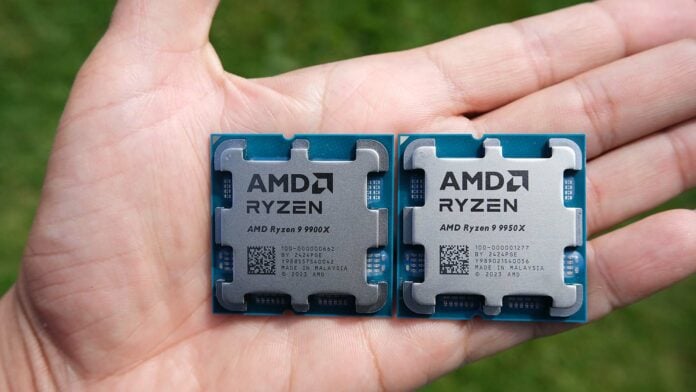Zen 5-toting Ryzen 9000 Series CPUs are now upon us. Launched on the desktop in staggered fashion, I first laid review eyes on the Ryzen 7 9700X and Ryzen 5 9600X last week. Designed with efficiency in mind, AMD made little progress in performance compared to the previous generation. Now, however, it’s the turn of Ryzen 9 9950X and 9900X to show what they can do. I’m expecting class-leading performance, because anything else simply won’t do.
Ryzen 9 9950X puffs its silicon chest out through a 16C32T design that’s in keeping with three prior generations. It’s clear to me that AMD has the ability to shoehorn more cores for mainstream desktop – Ryzen Threadripper Pro, for example, scales to 96C192T – but doesn’t feel the need to on the AM5 platform. This statement says as much about the state of the competition than anything else.
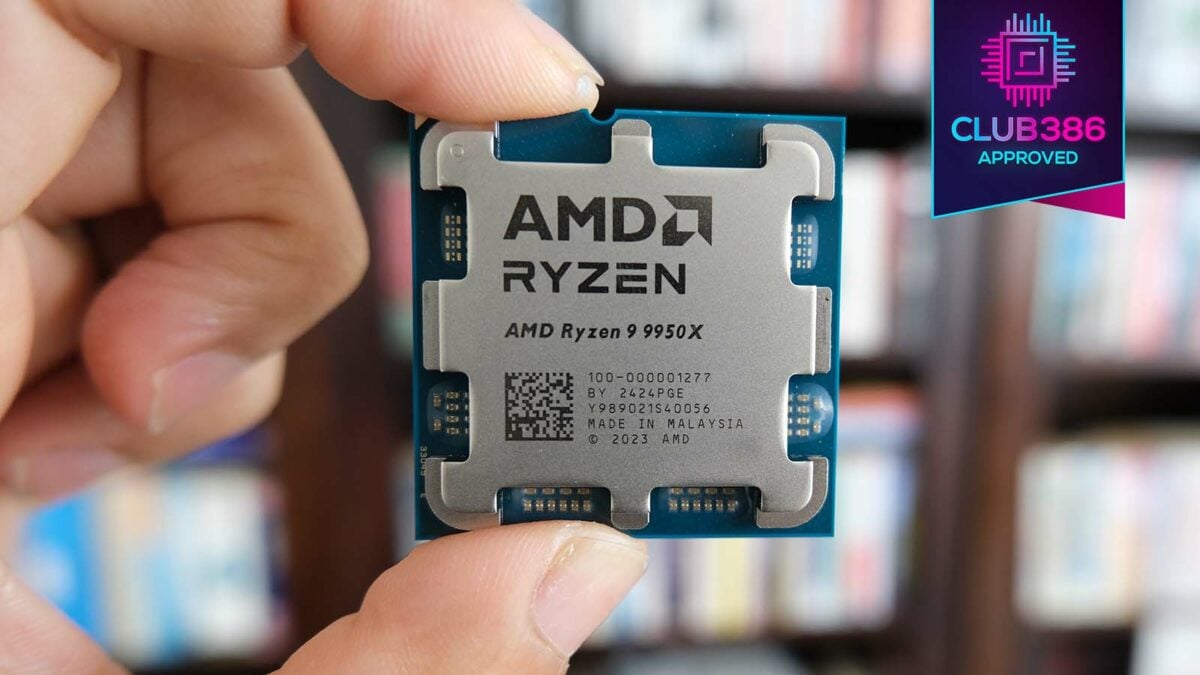
AMD Ryzen 9 9950X and Ryzen 9 9900X
£649 / £499
Pros
- 9950X fastest desktop CPU
- Solid value for flagship chip
- Homogeneous cores
- Great temperatures
- AM5 socket longevity
Cons
- 9900X feels overpriced
- Marginal gen improvements
- High platform power draw
Club386 may earn an affiliate commission when you purchase products through links on our site.
How we test and review products.
Nevertheless, largely unshackled from TDP limitations plaguing performance of mid-range Ryzen 9000 Series chips, there’s cause for enthusiast optimism.
Ryzen 9 9900X, on the other hand, gives up four cores and a smidge of frequency in the name of cost, lower power, and a more amenable retail price.
| Model | Cores / Threads | TDP | L3 Cache | Base Clock | Boost Clock | Launch MSRP |
|---|---|---|---|---|---|---|
| 9000 (2024) | ||||||
| Ryzen 9 9950X | 16 / 32 | 170W | 64MB | 4.3GHz | 5.7GHz | $649 |
| Ryzen 9 9900X | 12 / 24 | 120W | 64MB | 4.4GHz | 5.6GHz | $499 |
| Ryzen 7 9700X | 8 / 16 | 65W | 32MB | 3.8GHz | 5.5GHz | $359 |
| Ryzen 5 9600X | 6 / 12 | 65W | 32MB | 3.9GHz | 5.4GHz | $279 |
| 7000 (2022) | ||||||
| Ryzen 9 7950X | 16 / 32 | 170W | 64MB | 4.7GHz | 5.7GHz | $699 |
| Ryzen 9 7900X | 12 / 24 | 170W | 64MB | 4.7GHz | 5.6GHz | $549 |
| Ryzen 7 7700X | 8 / 16 | 105W | 32MB | 4.5GHz | 5.4GHz | $399 |
| Ryzen 5 7600X | 6 / 12 | 105W | 32MB | 4.7GHz | 5.3GHz | $299 |
| 5000 (2020) | ||||||
| Ryzen 9 5950X | 16 / 32 | 105W | 64MB | 3.4GHz | 4.9GHz | $799 |
| Ryzen 9 5900X | 12 / 24 | 105W | 64MB | 3.7GHz | 4.8GHz | $549 |
| Ryzen 7 5700X | 8 / 16 | 65W | 32MB | 3.4GHz | 4.6GHz | $299 |
| Ryzen 5 5600X | 6 / 12 | 65W | 32MB | 3.7GHz | 4.6GHz | $299 |
| 3000 (2019) | ||||||
| Ryzen 9 3950X | 16 / 32 | 105W | 64MB | 3.5GHz | 4.7GHz | $749 |
| Ryzen 9 3900X | 12 / 24 | 105W | 64MB | 3.8GHz | 4.6GHz | $449 |
| Ryzen 7 3700X | 8 / 16 | 65W | 32MB | 3.6GHz | 4.4GHz | $329 |
| Ryzen 5 3600X | 6 / 12 | 95W | 32MB | 3.8GHz | 4.4GHz | $249 |
Analysis
A look through specifications reveals no surprises. Ryzen 9 9950X and 9900X follow the core-and-thread formula adopted since Ryzen 3000 Series from 2019. This means generational performance gains emanate from improvements in architecture and caching than from a boost derived from pumping more cores.
AMD’s strategy is at odds with Intel who has taken recent opportunities to house performance and efficient cores on the same package, as well as add more of them through the 12th, 13th, and 14th Generations. Intel is going through myriad issues of its own, so AMD is in the fortunate position of not having to do much to retain market share.
Nevertheless, I feel as if banking on moving the needle though architecture alone stymies potential and stagnates the PC industry as a whole; it needs processors that enthusiasts are truly excited about.
I made mention of this in the Ryzen 7 9700X and Ryzen 5 9600X review, but I feel as if AMD’s focus with Zen 5 is rightfully on datacentre performance. Manifest changes in microarchitecture between Zen 4 and 5 – wider execution and dispatch, faster and larger caches, bulked-up floating-point unit, et al – lend themselves to healthy leaps in many, shall I say, heavy-throughput applications prevalent in that arena.
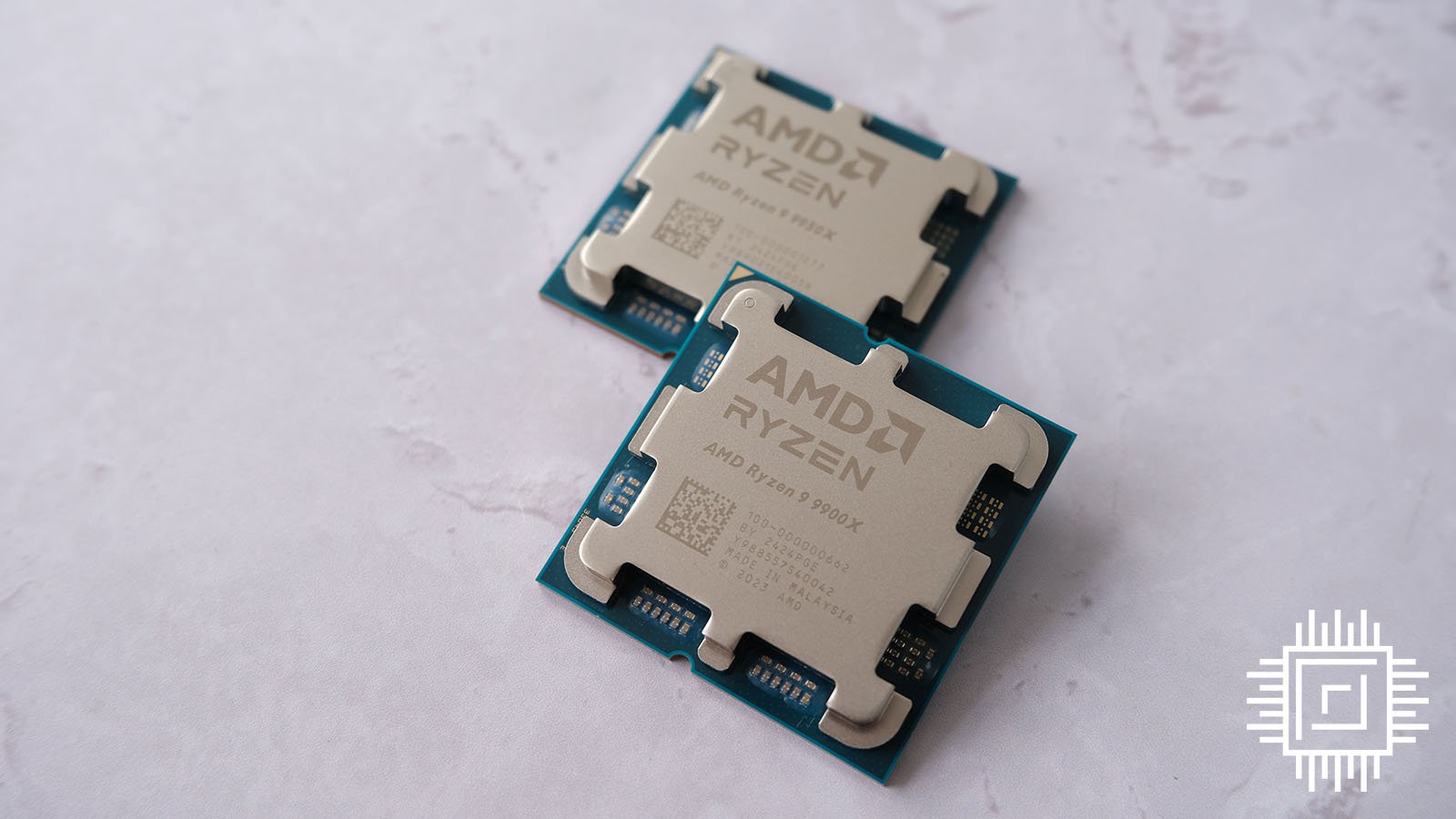
It literally pays to build a microarchitecture for your most important business unit. As desktop chips such as the Ryzen 9 9950X and 9900X are naturally cut from the same base blueprint, it is reasonable to assume a moderate improvement rather than a huge increase from Ryzen 7000 Series.
A tacit admission that Zen 5-infused Ryzen 9000 Series processors are not generational wonders is framed by price. Top-bin 9950X, priced at $649 (£610), is actually cheaper than any headline Ryzen chip in my table. For example, taking inflation broadly into account, Ryzen 9 3950X effectively costs $920 in today’s money. Here’s AMD effectively saying look, we can’t give you too much more performance this time around, but we do deliver on value.
And there’s more to consider. Unlike Intel, AMD invests in longer-term platform support that makes it easy to upgrade from one generation of CPU to the next without having to buy a new motherboard or memory. The AM5 socket is supported through 2027, meaning there’s opportunity of upgrading to a Zen 6 or perhaps even a Zen 7 chip on the same platform.
Curiously, Ryzen 9 9900X costs $499 USD and £460 here in the UK, representing a larger percentage difference than normal, which is good news for the enthusiast. I’d usually expect the UK price to map over to £479, including VAT, so it may be a case of AMD appreciating that it needs to be more aggressive here, especially when considering the more powerful Ryzen 9 7950X is readily available for less than £450.
Efficiency is also a key Ryzen 9000 Series tenet. All but Ryzen 9 9950X have lower TDPs than commensurate Ryzen 7000 Series. This dialling down on wattage is not peculiar for AMD; Ryzen 5000 and 3000 Series chips are similar in their energy requirement.
The CPUs
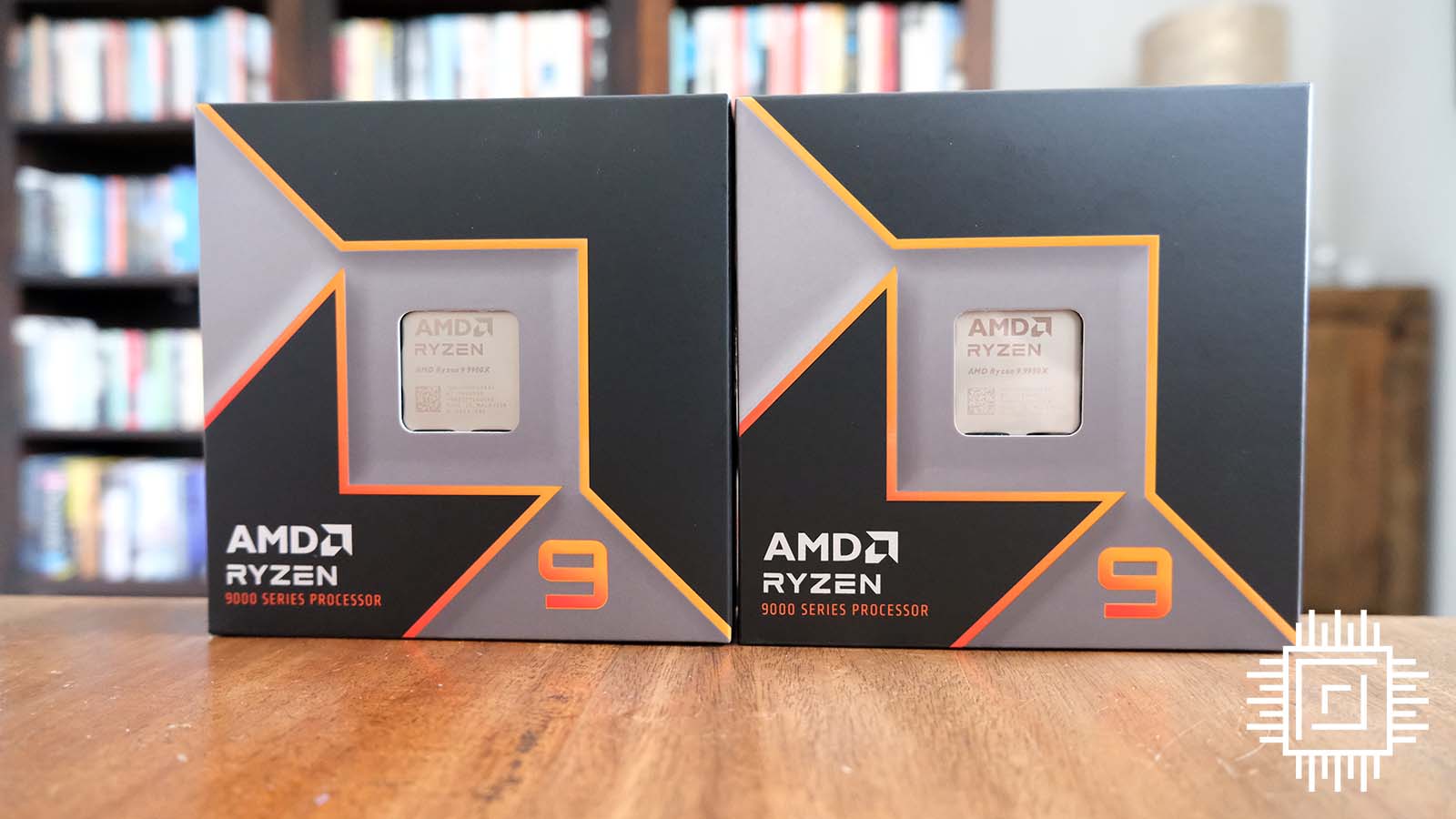
Little has changed aesthetically in the transition between Ryzen 7000 and 9000 Series. Chips look familiar because they are. Neither high-end processor arrives with a cooling solution in tow, so you need to source your own. A decent air cooler will do the job for the 120W Ryzen 9 9900X, though I recommend a quality AIO for the 170W Ryzen 9 9950X.
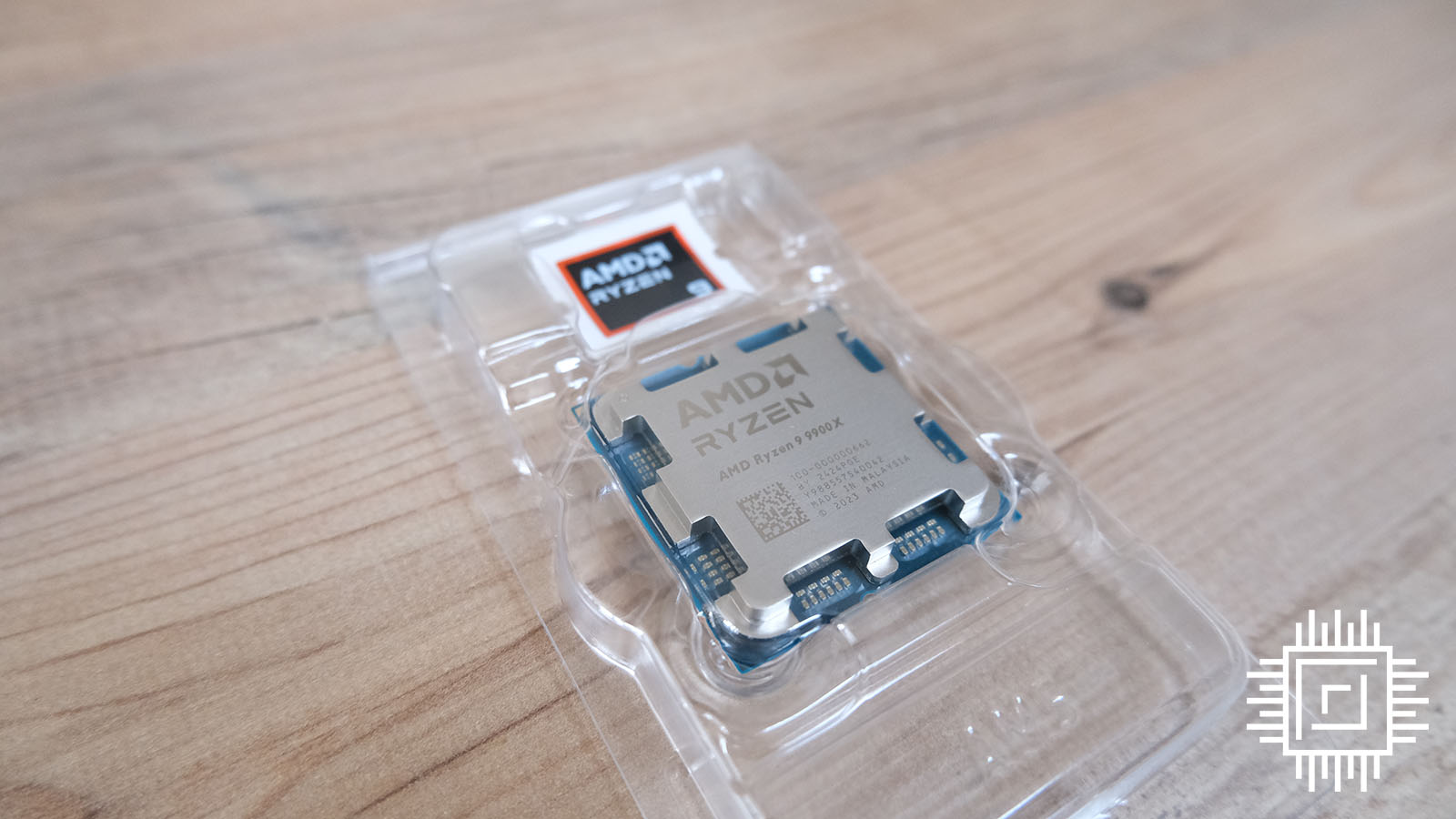
The first thing I think of when looking at AMD AM5 processors is how messy the heatspreader will become once thermal paste is applied and spread into the nooks and crannies through pressure applied by the cooler. I wholeheartedly recommend a thermal paste guard.
There’s really not a lot in the boxes, save for the processors ensconced in protective casing. AMD used to knock it out of the park with respect to packaging; I’d like to see more attention paid to this because enthusiasts appreciate the wow factor after laying down a generous amount of hard-earned cash.
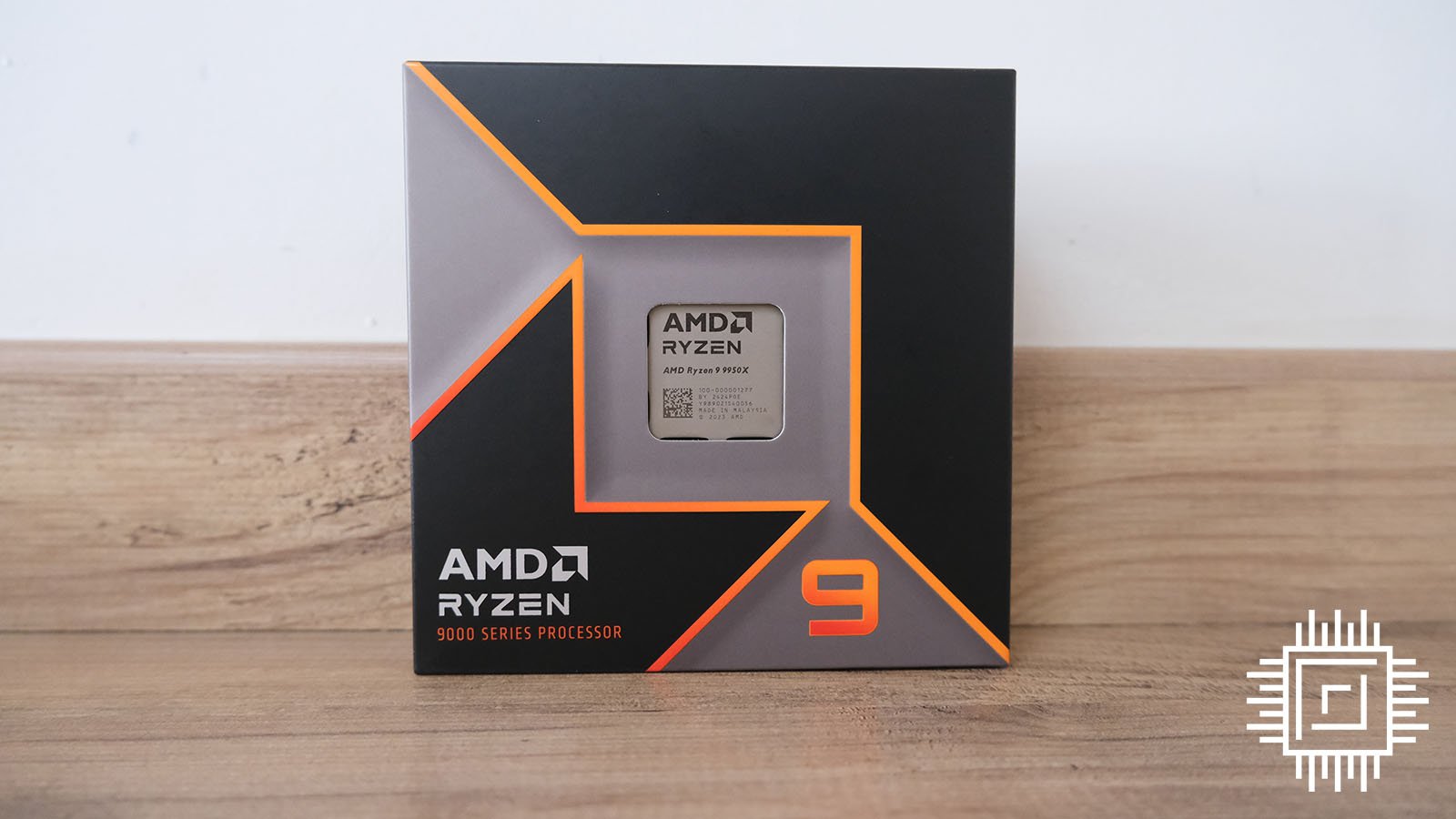
Yes, this is the fastest desktop AMD processor ever launched. Time to saddle up the test system and let rip.
Testing
I have benchmarked, from absolute scratch, relevant processors from the AMD Ryzen 9000, 7000, and Intel Core 14th Gen series. AMD chips are tested on an MSI MEG X670E Ace, while Intel run on an ASRock Phantom Gaming Z790 Nova WiFi. Both are updated to the latest BIOS and run processors at their manufacturer-recommended TDPs.
By the way, I’m continually miffed by how long AMD’s platform takes to boot. Memory training is still very much in evidence with Ryzen 9000 Series, and after testing a glut of chips in consecutive fashion, the boot times between AMD and Intel platforms is readily apparent.
Common components include 64GB (2x32GB) Kingston Fury Beast memory at DDR5-6000 CL36, 2TB WD_Black SN850X SSD, Zotac GeForce RTX 4090 graphics (560.70 drivers), be quiet Dark Power 13 1,000W PSU, and Arctic Liquid Freezer III 420 AIO cooling.
One needs to be careful when swapping between certain AMD processors. Dual-CCD models use a PPM provisioning file driver for optimal performance in gaming, achieved by the parking of specific cores that mostly mitigate issues arising from inevitable latency considerations when dealing with more than one CCD. This driver can become misapplied when multiple single- and dual-CCD processors are run through the system, though I saw no evidence of this occurring in my tests.
Prefacing productivity results and providing necessary context, it makes sense to list each tested chip’s all-core speed when running Cinebench 2024’s nT test for 10 minutes. Understanding frequency lays appropriate foundation for what you are about to see.
| Chip | All-core frequency | Manufacturer TDP |
|---|---|---|
| AMD Ryzen 9 9950X | 5.001GHz | 170W |
| AMD Ryzen 9 9900X | 5.107GHz | 120W |
| AMD Ryzen 9 7950X | 5.050GHz | 170W |
| AMD Ryzen 9 7950X3D | 4.552GHz | 120W |
| AMD Ryzen 7 9700X | 4.634GHz | 65W |
| AMD Ryzen 7 7700X | 5.285GHz | 105W |
| AMD Ryzen 5 9600X | 5.090GHz | 65W |
| AMD Ryzen 5 7600X | 5.358GHz | 105W |
| AMD Ryzen 7 7800X3D | 4.835GHz | 120W |
| Intel Core i9-14900K | 4.712GHz | 253W |
| Intel Core i7-14700K | 4.523GHz | 253W |
| Intel Core i5-14600K | 4.453GHz | 181W |
App Performance
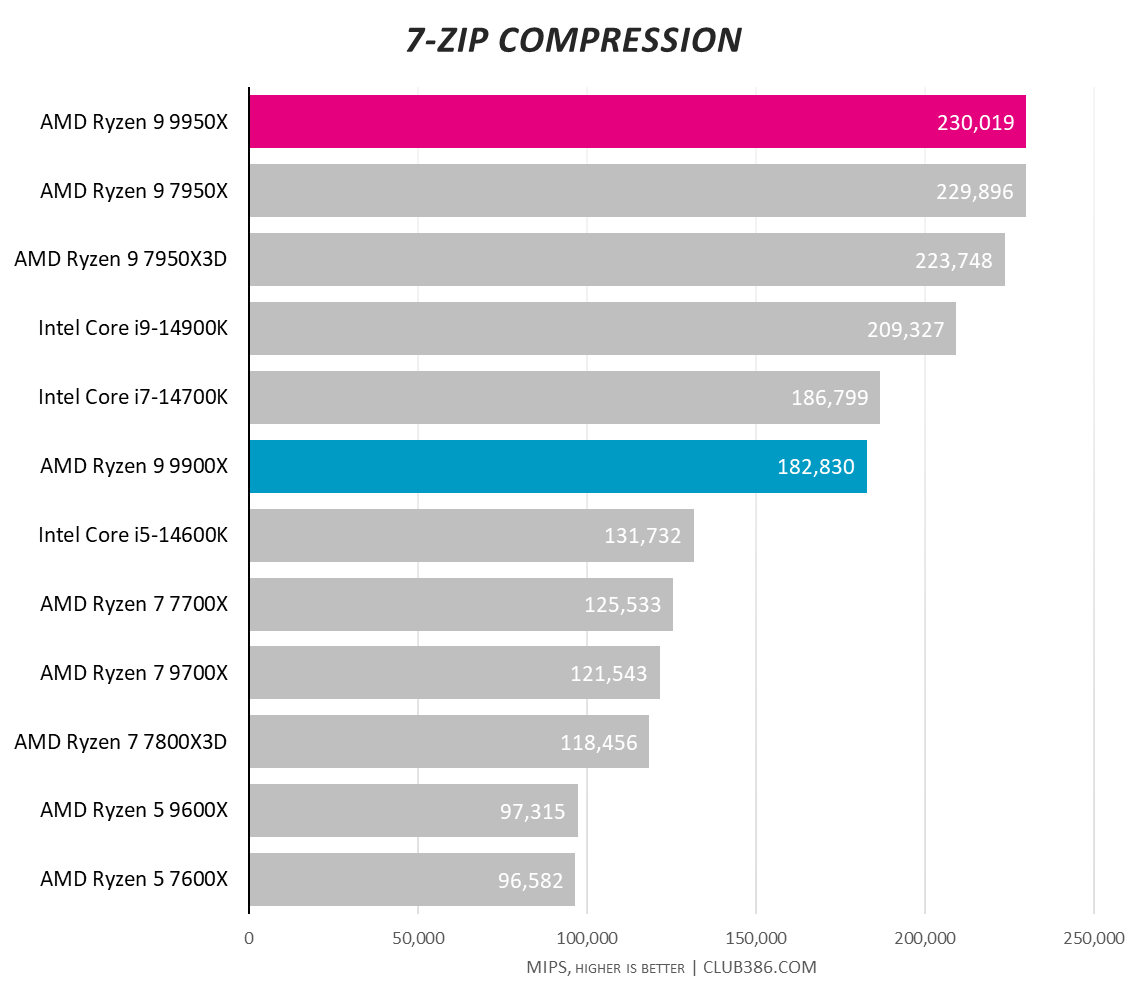
The ability of the Zen 5 architecture to extend beyond the previous generation is wholly down to how sensitive the application is to changes implemented by AMD.
There’s nothing much to write home about in the first test, where a very small lead for 9950X is expected. 9900X, on the other hand, falls in behind Intel Core i7-14700K. Remember that as you read on.
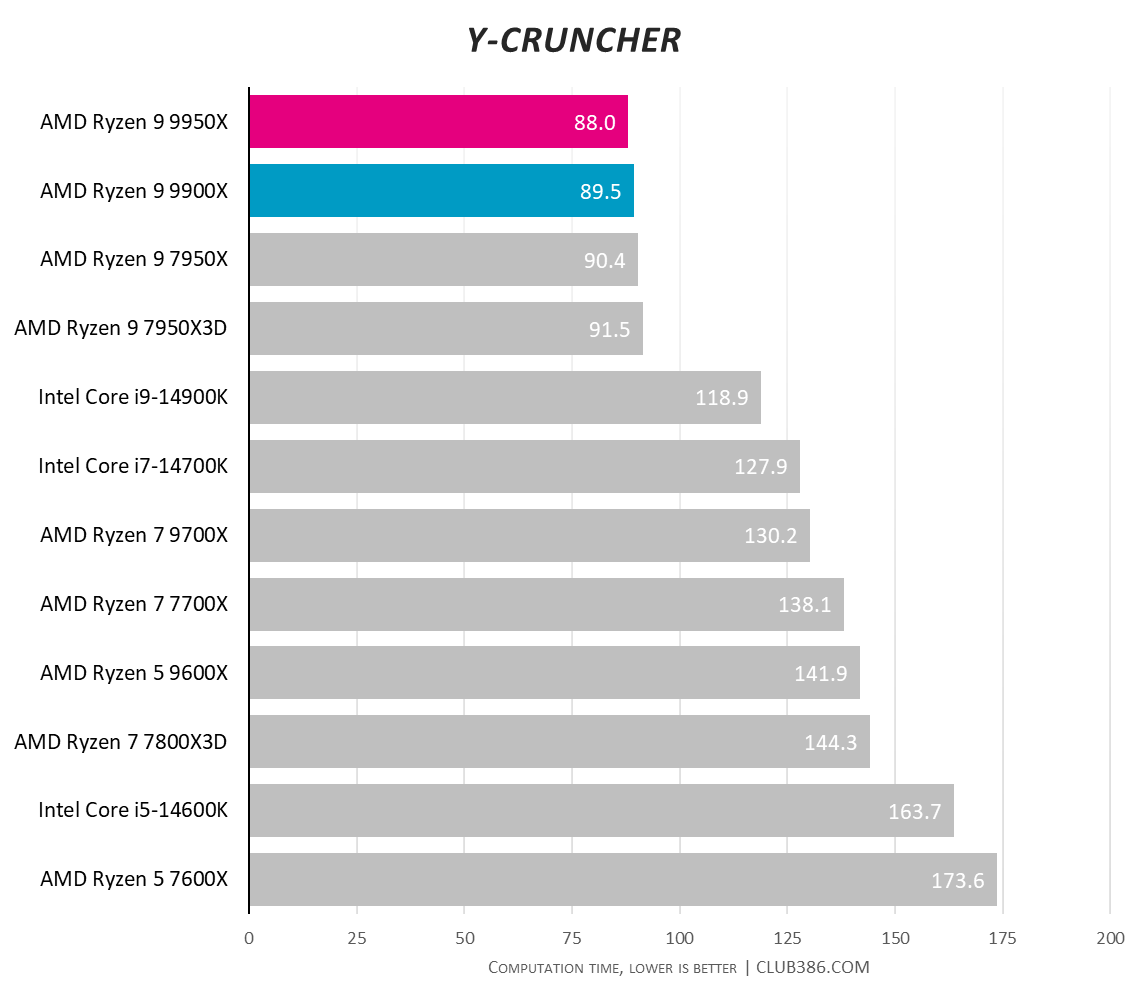
Math-intensive y-cruncher is a Zen 5 oddity. More-core 9950X doesn’t extend its lead out over 9900X, suggesting that the benchmark has a core sweet spot. Nevertheless, AMD processors are faster than Intel equivalents here.
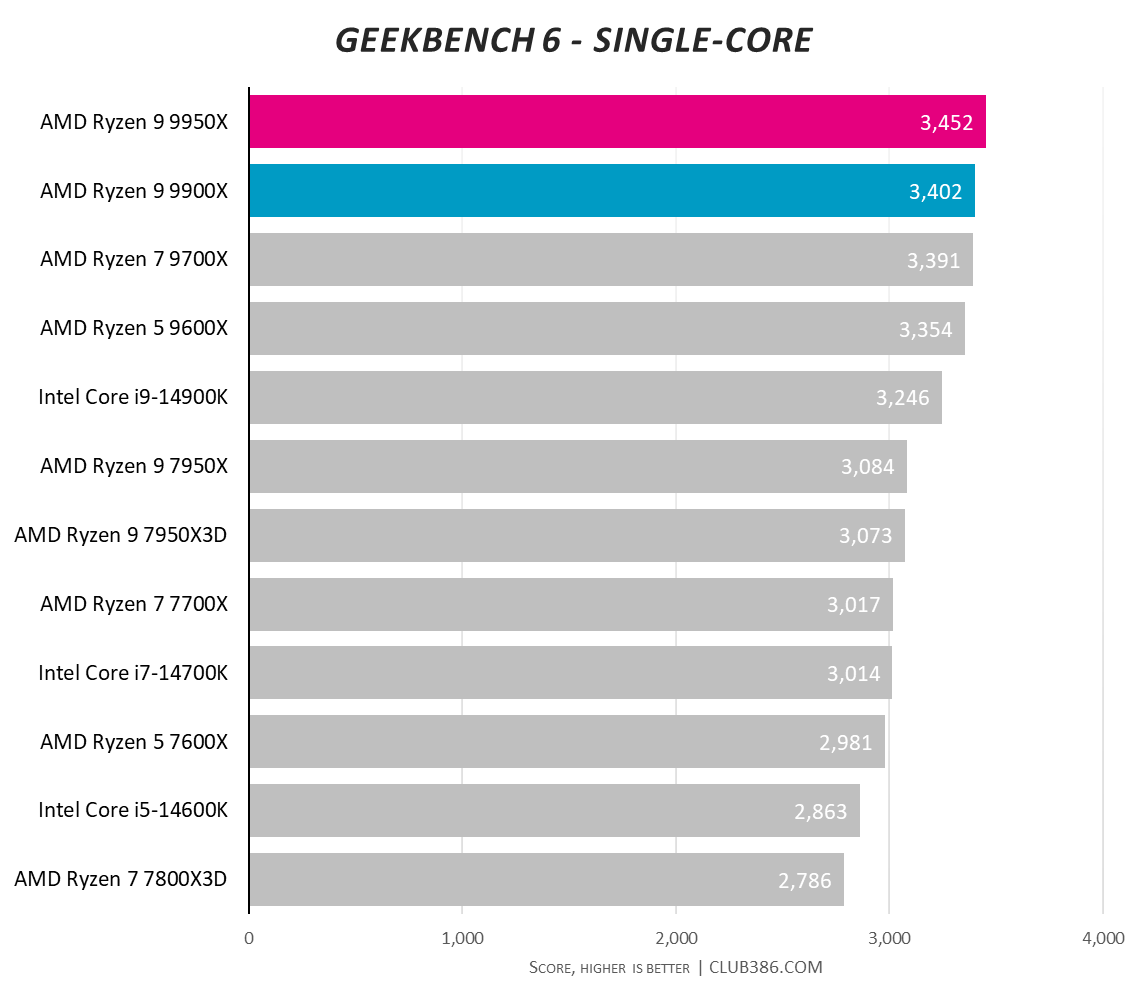
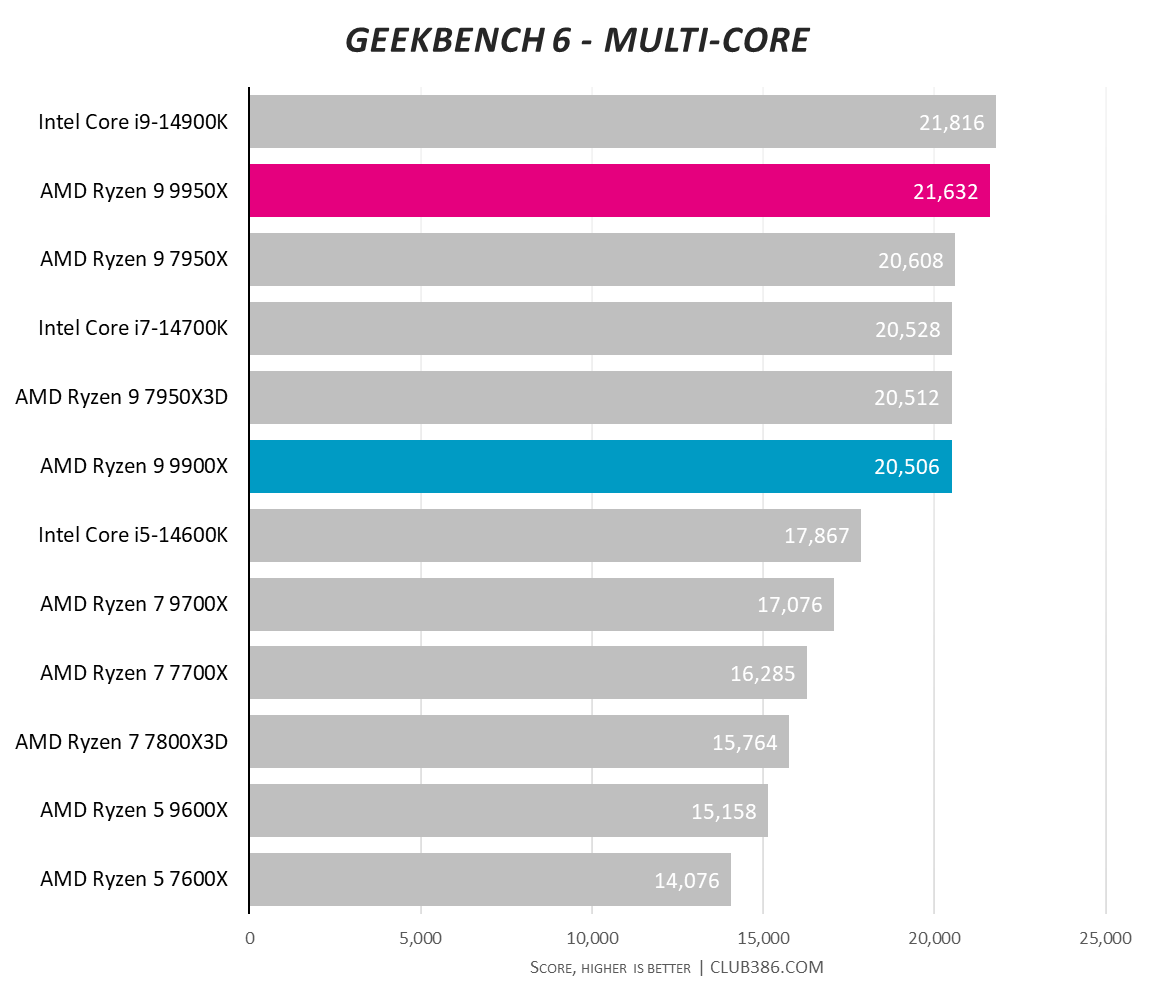
Zen 5 is strong in single-threaded use cases and only a few per cent quicker than Ryzen 7000 Series when all cores and threads are tasked. This is exactly what I saw in the 9700X and 9600X evaluations.
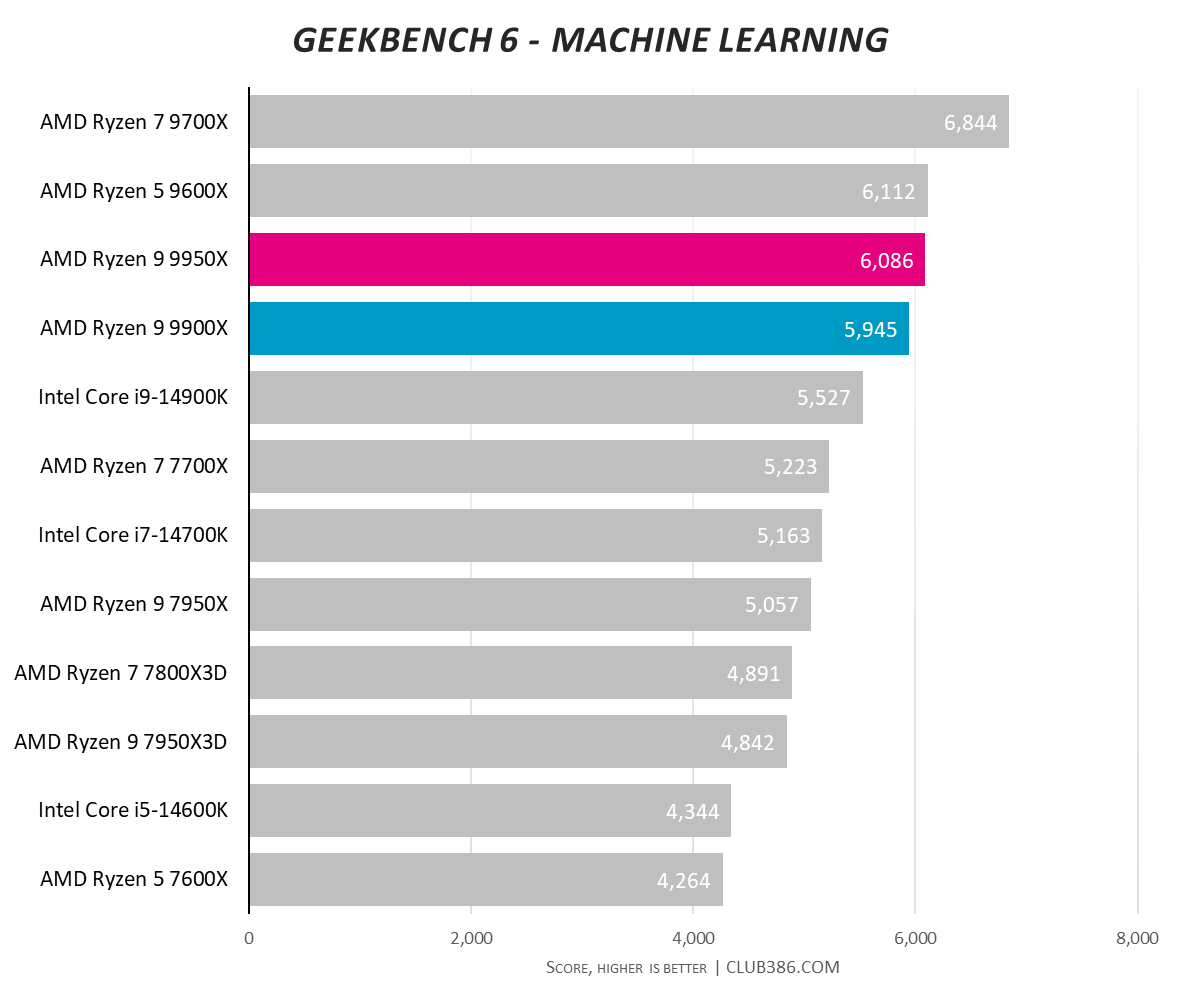
I have double-checked results to ensure they’re accurate. A logical assumption here is that a high-frequency single-CCD works better than those touting more cores and threads.
Content Creation
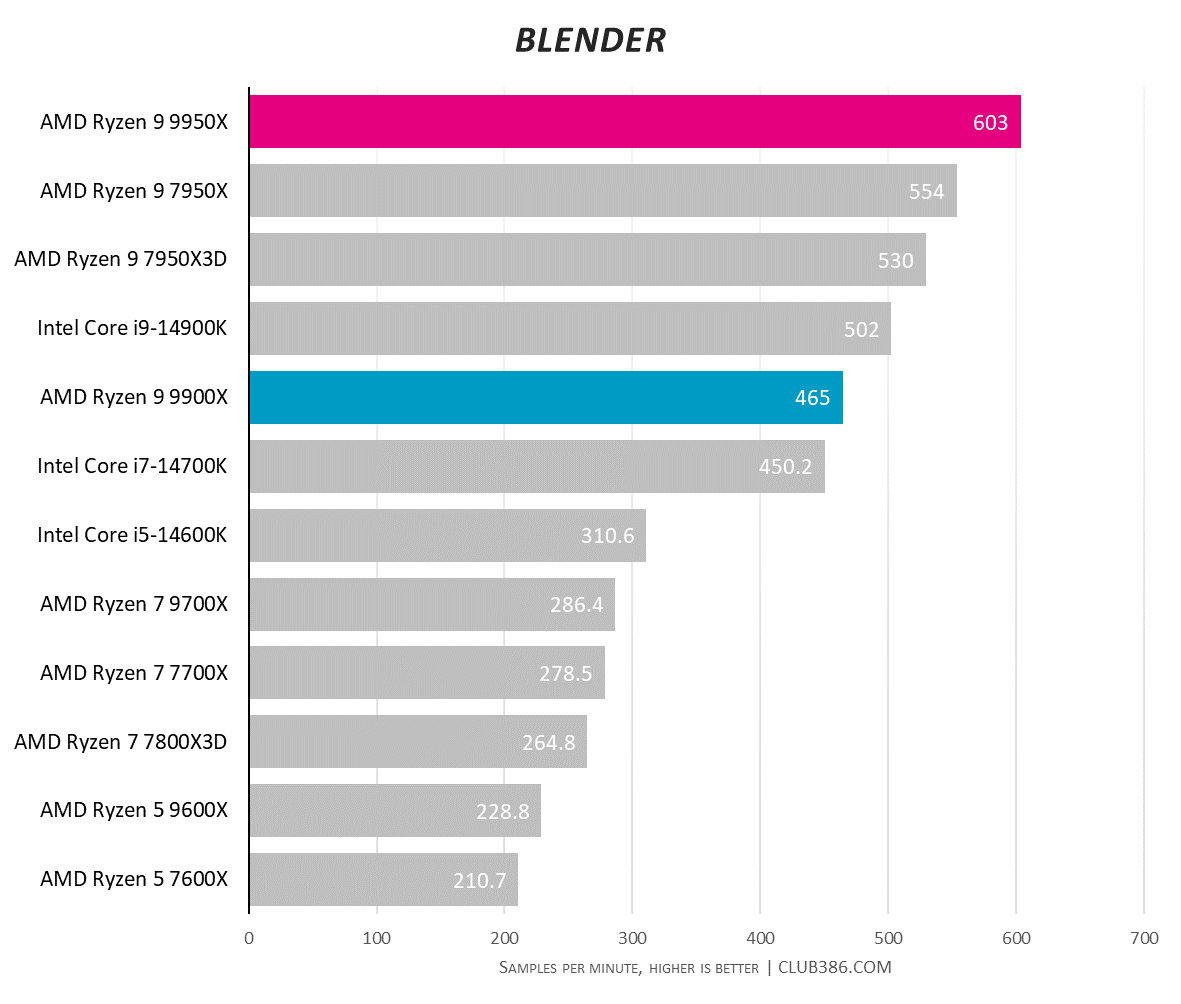
You can trust Blender to separate the multi-core wheat from the chaff. Ryzen 9 9950X sets a new standard, though being even handed, it’s only 9 per cent faster than 7950X and 14 per cent speedier than the lower-wattage 7950X3D.
Looking further down, Ryzen 9 9900X continues to trade blows withe the cheaper Intel Core i7-14700K.
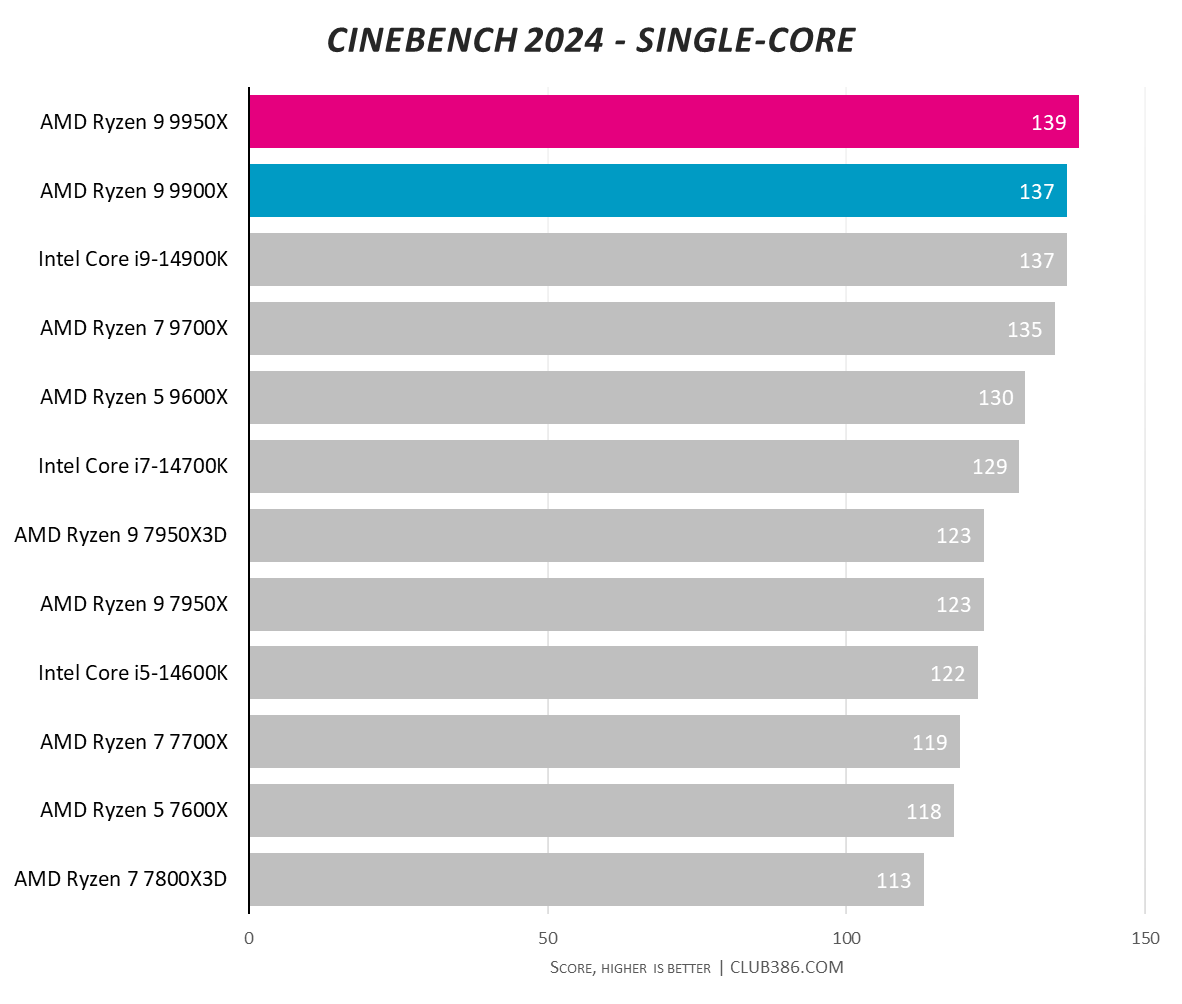
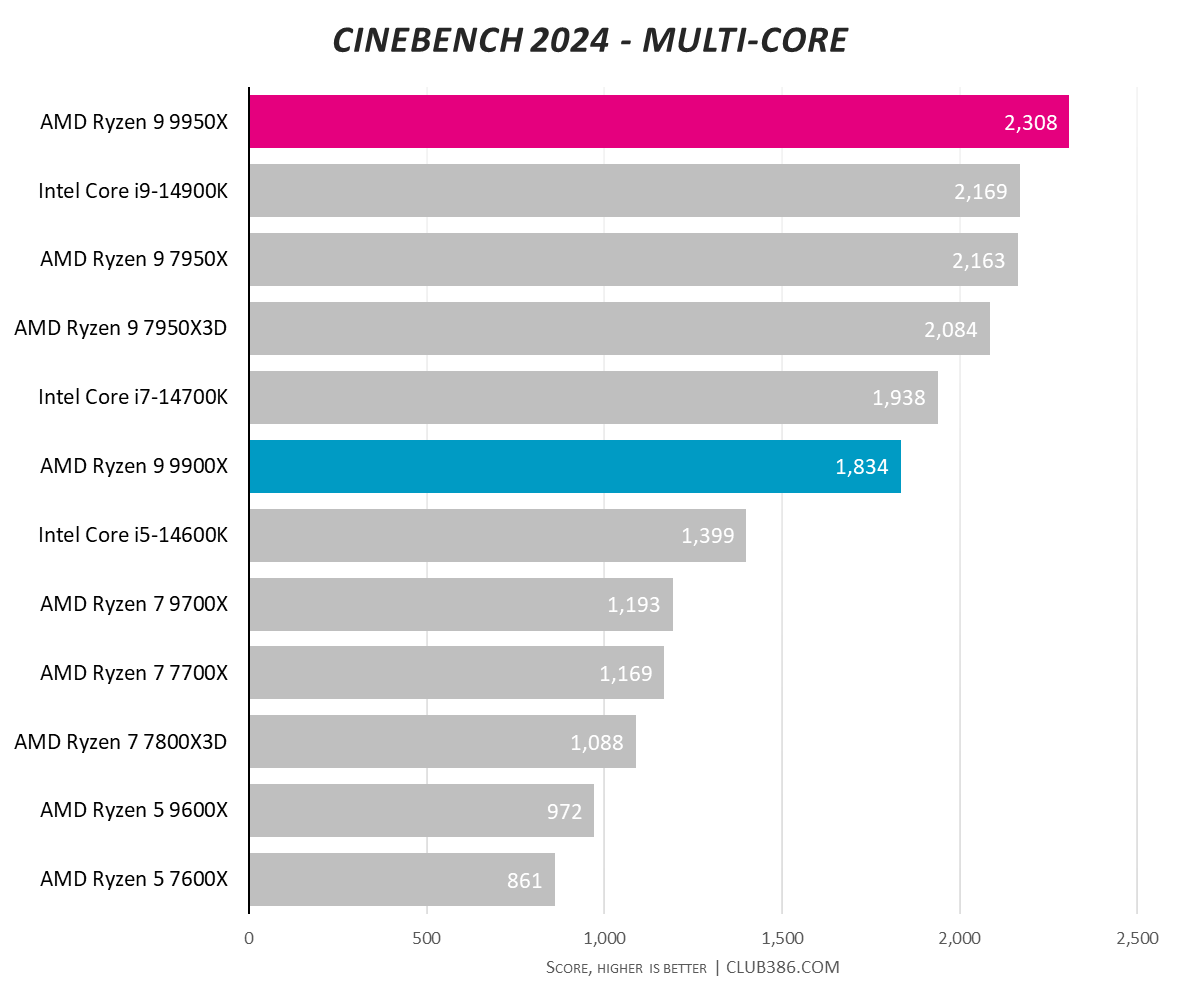
Ryzen 9 9950X does what it’s supposed to and takes the lead in most applications. I’m less enthused about the 12C24T Ryzen 9 9900X; it’s hard to make a case for it against, say, the aforementioned 14700K or price-comparable 7950X.
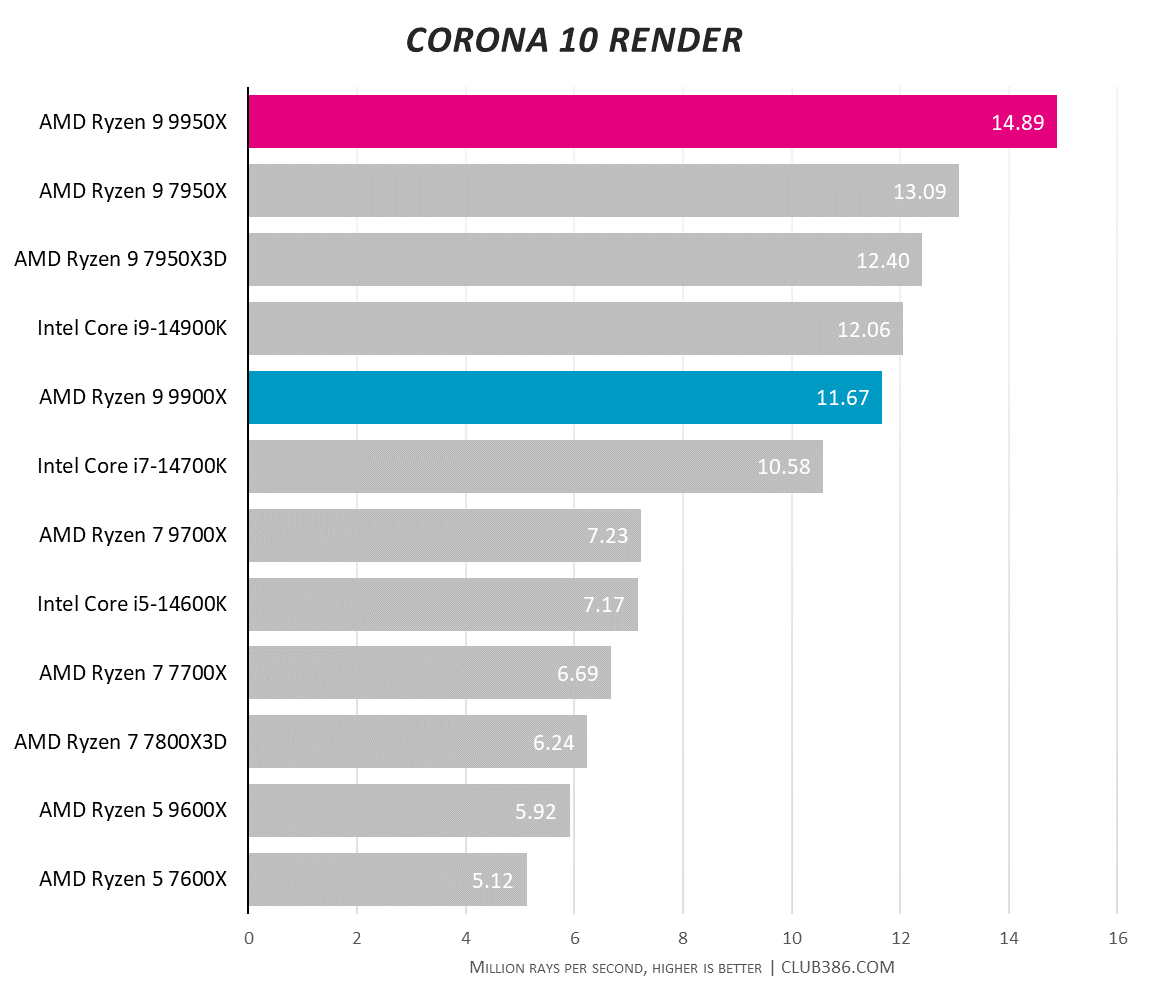
Latest Ryzens do well in a straight-up roll-yer-sleeves-up rendering fight.
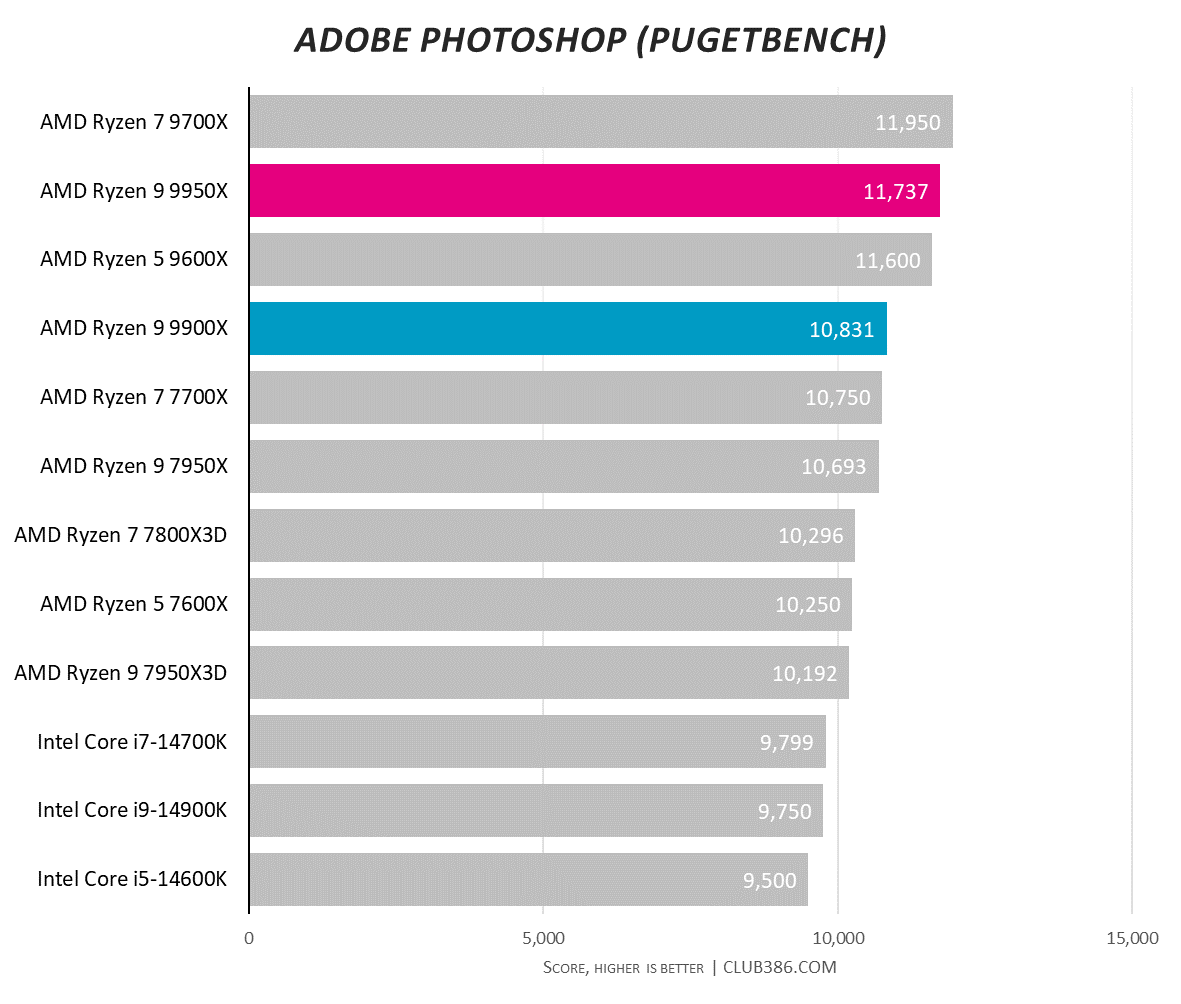
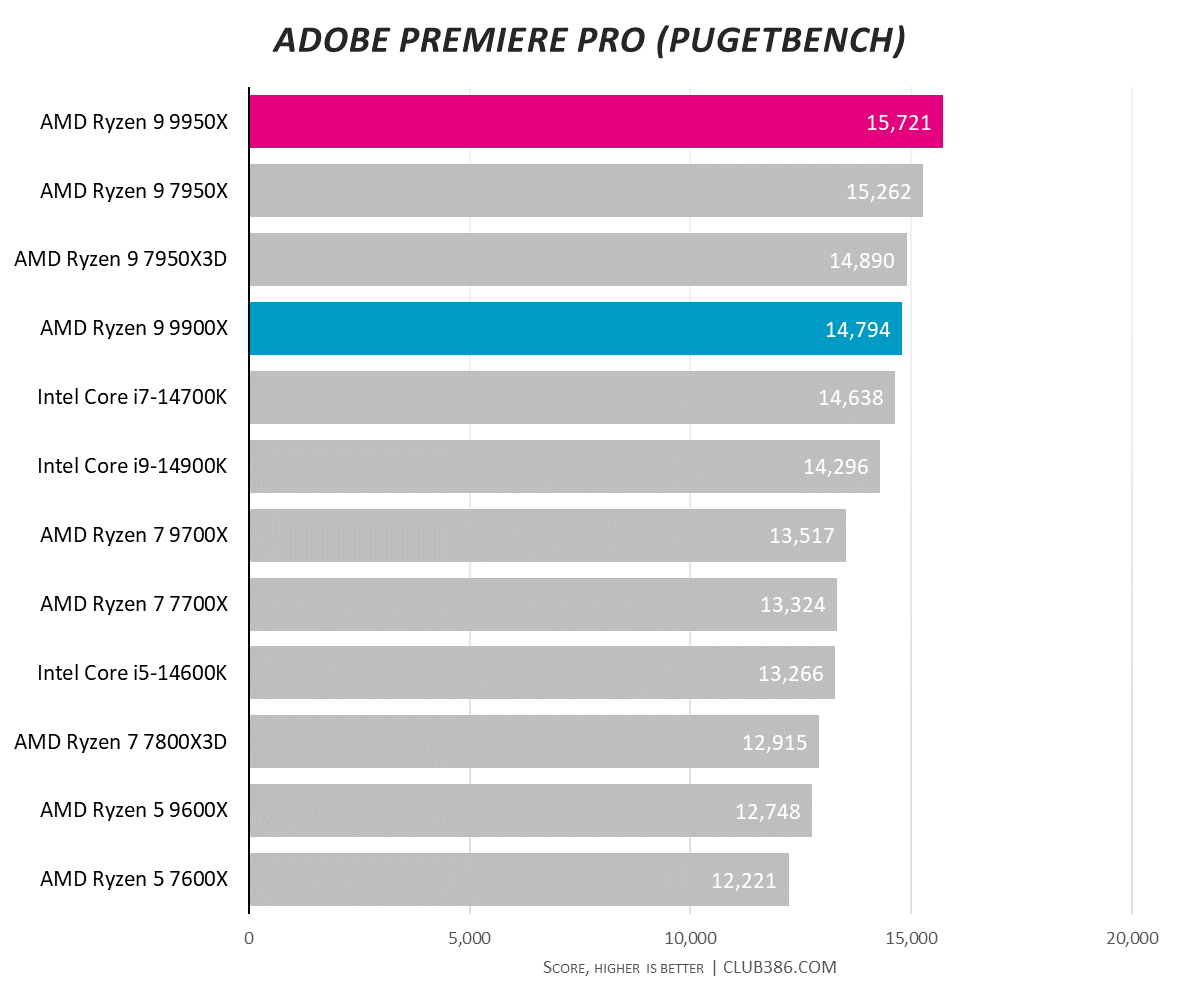
And solid performance in commonly used media applications.
Memory
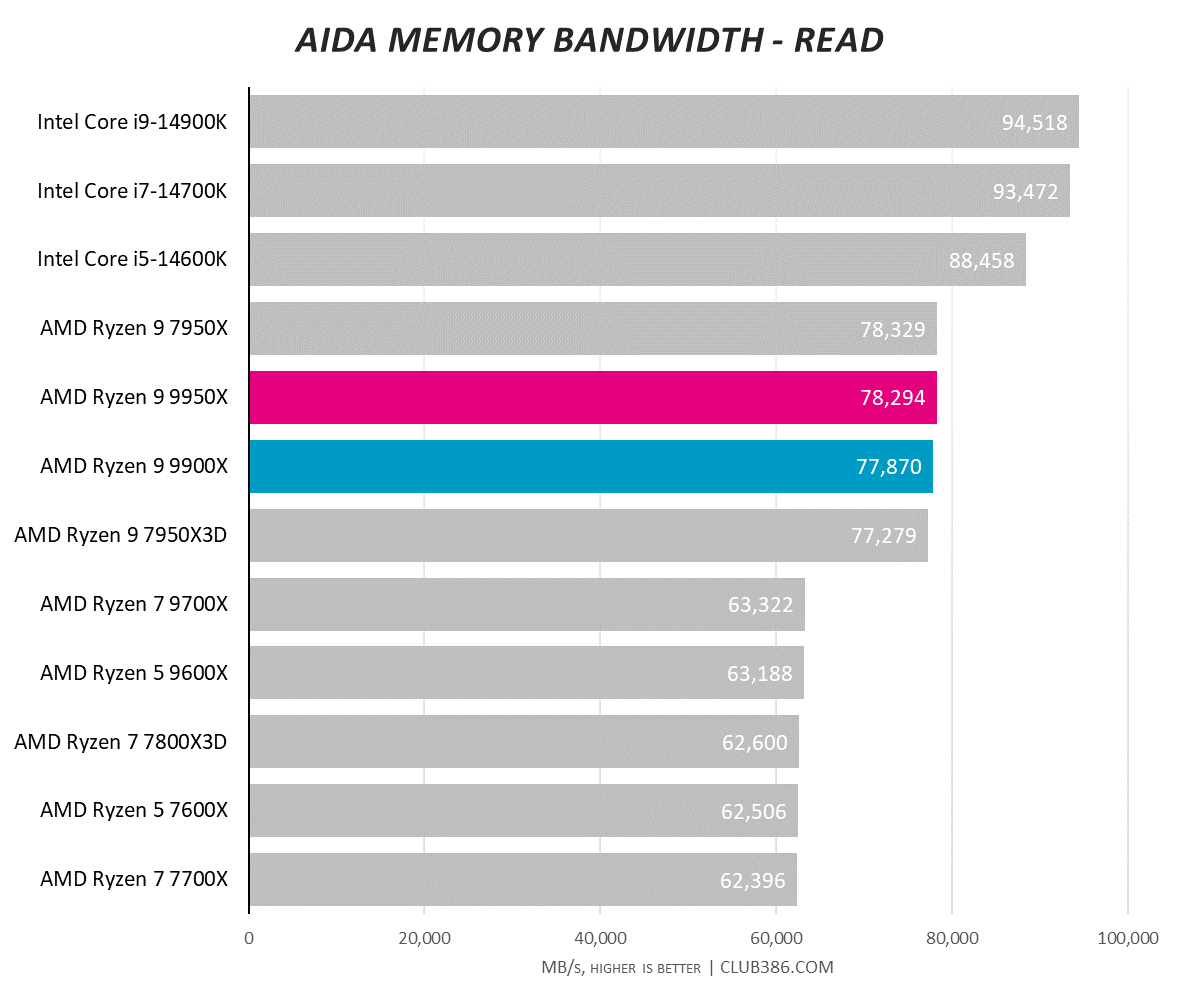
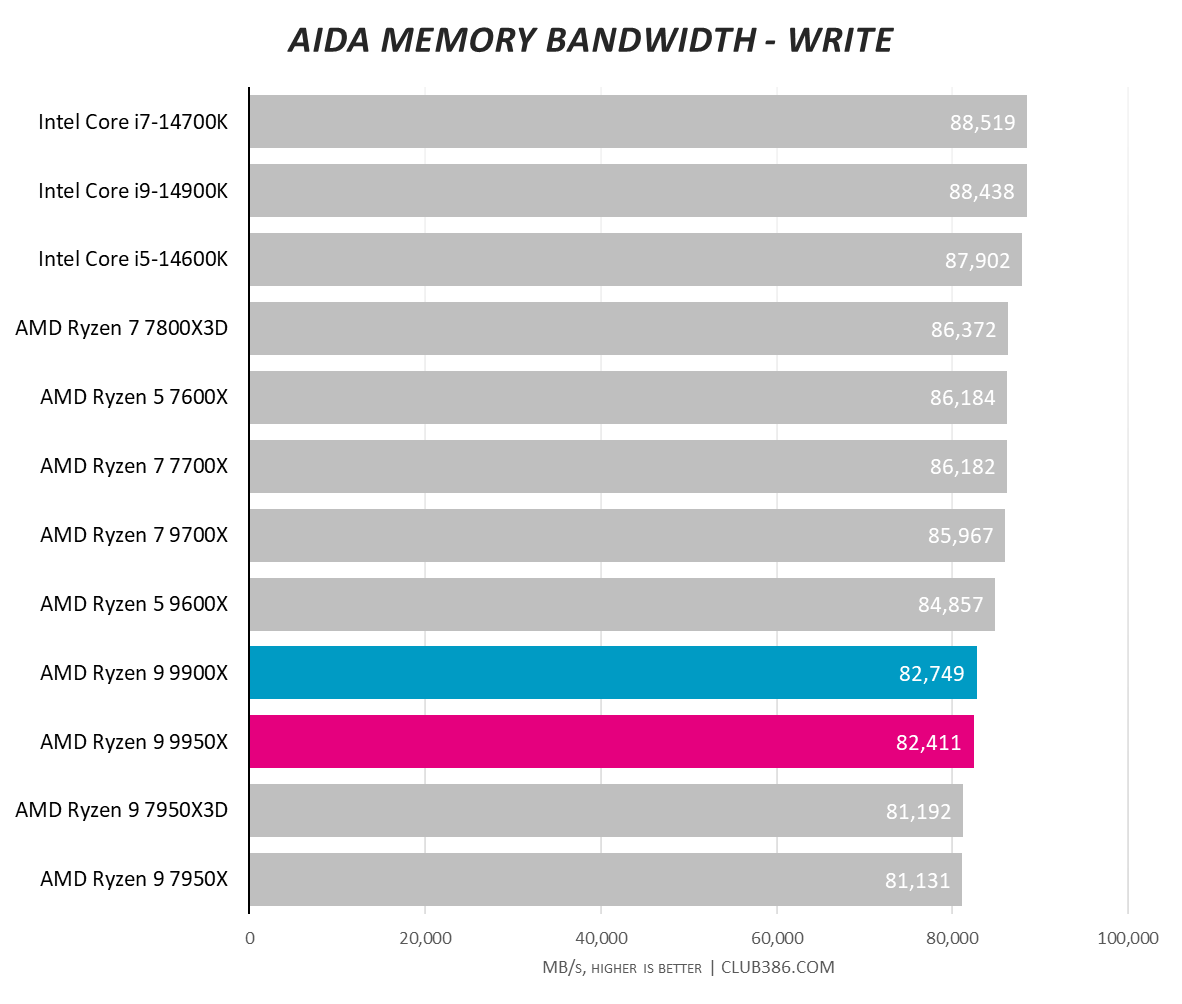
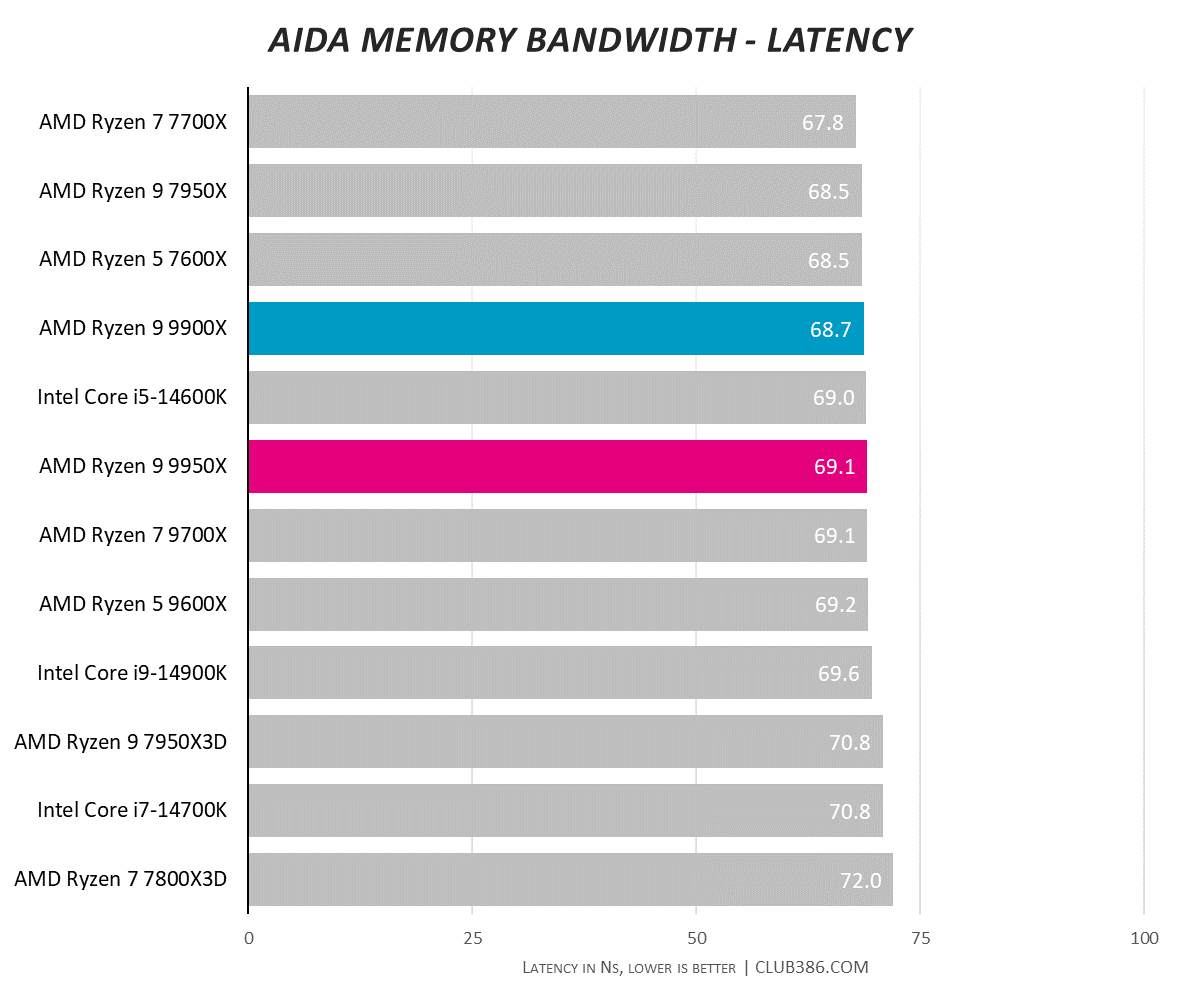
You’re not going to see large differences in the memory subsystem because AMD hasn’t changed the topology between generations.
Gaming
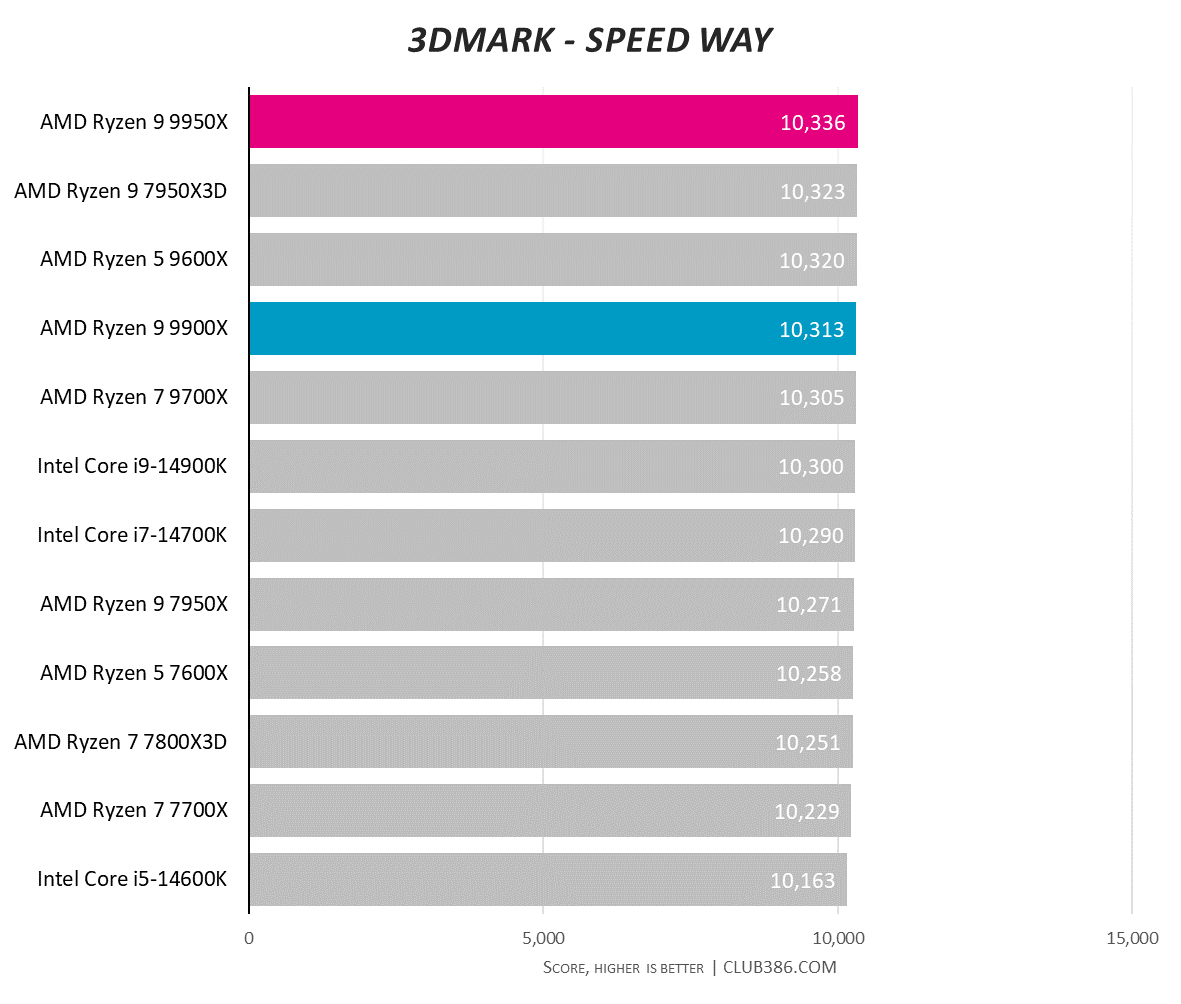
Remarkable consistency between processors when allied to a GeForce RTX 4090.
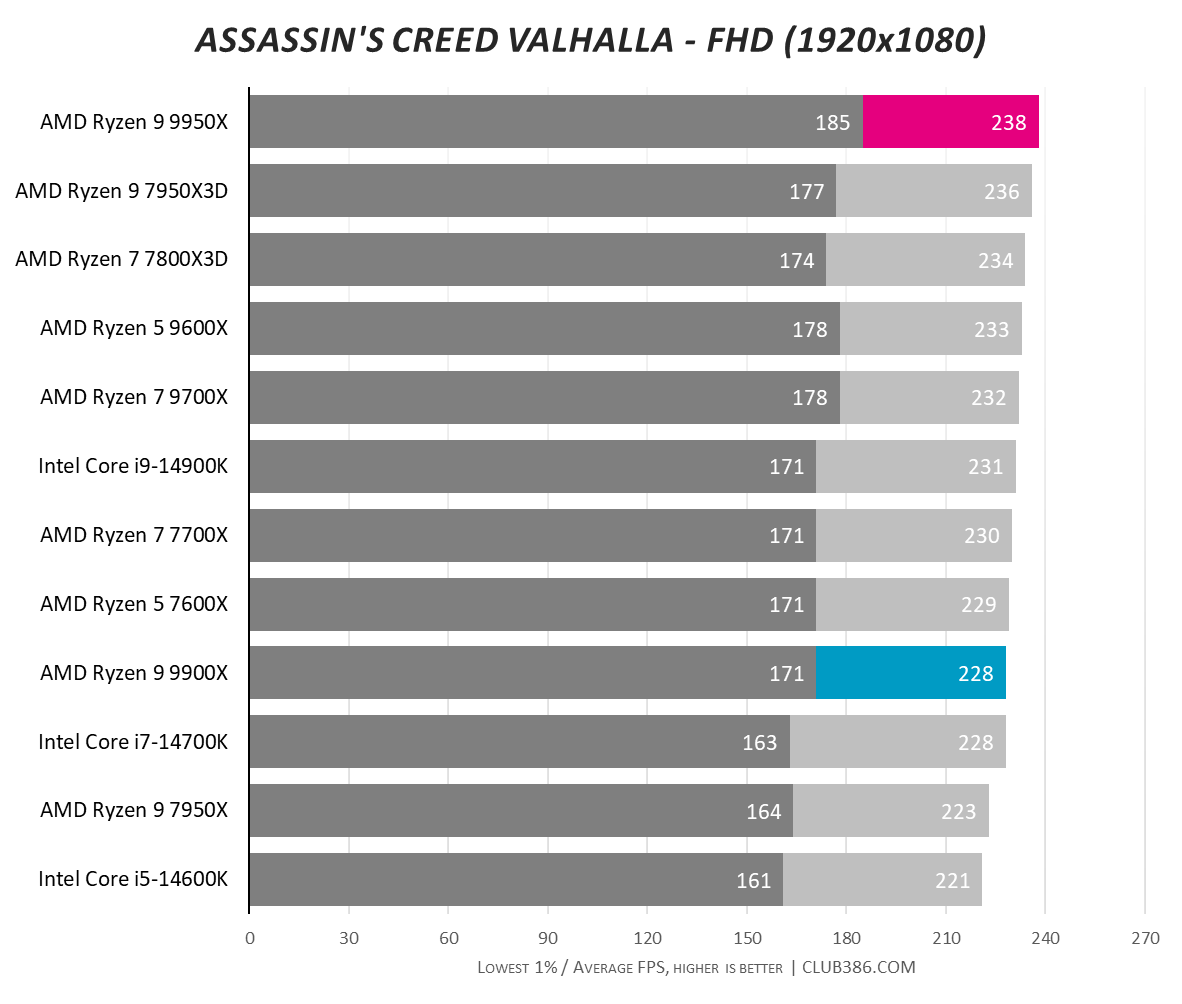
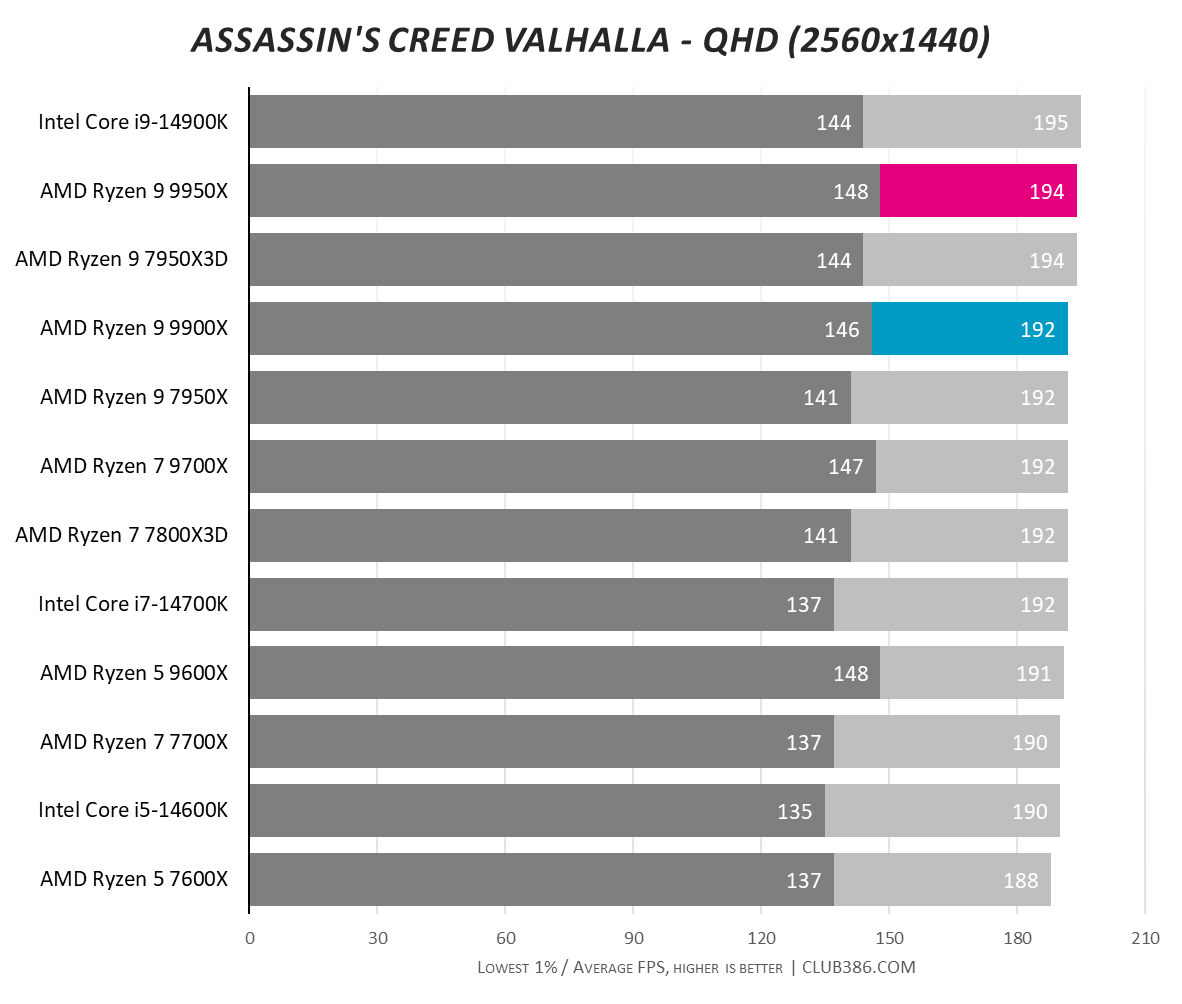
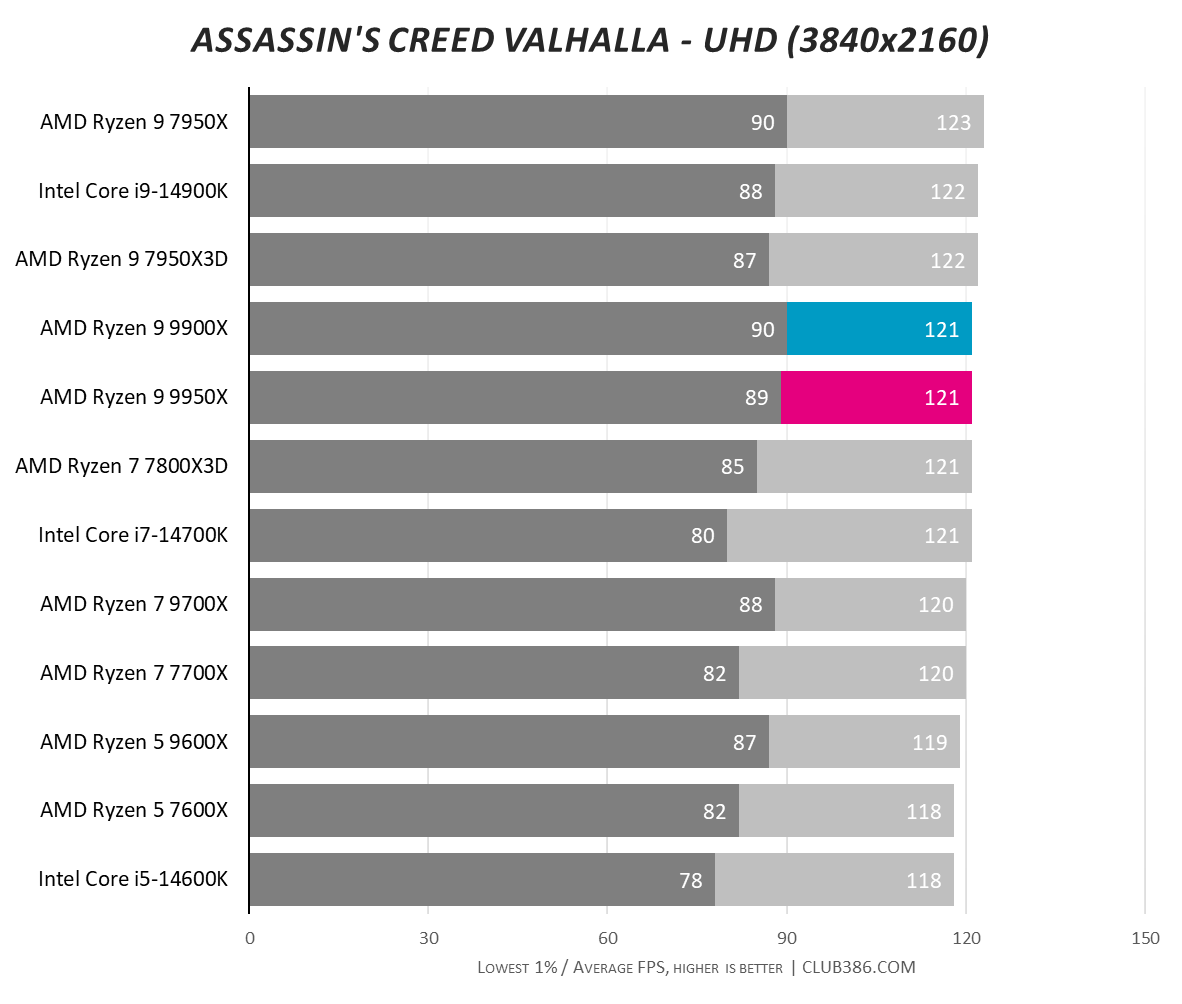
There’s really not a lot to separate the glut of chips in Assassin’s Creed Valhalla. For the most part, highlighted bars are at the higher end of the graphs.
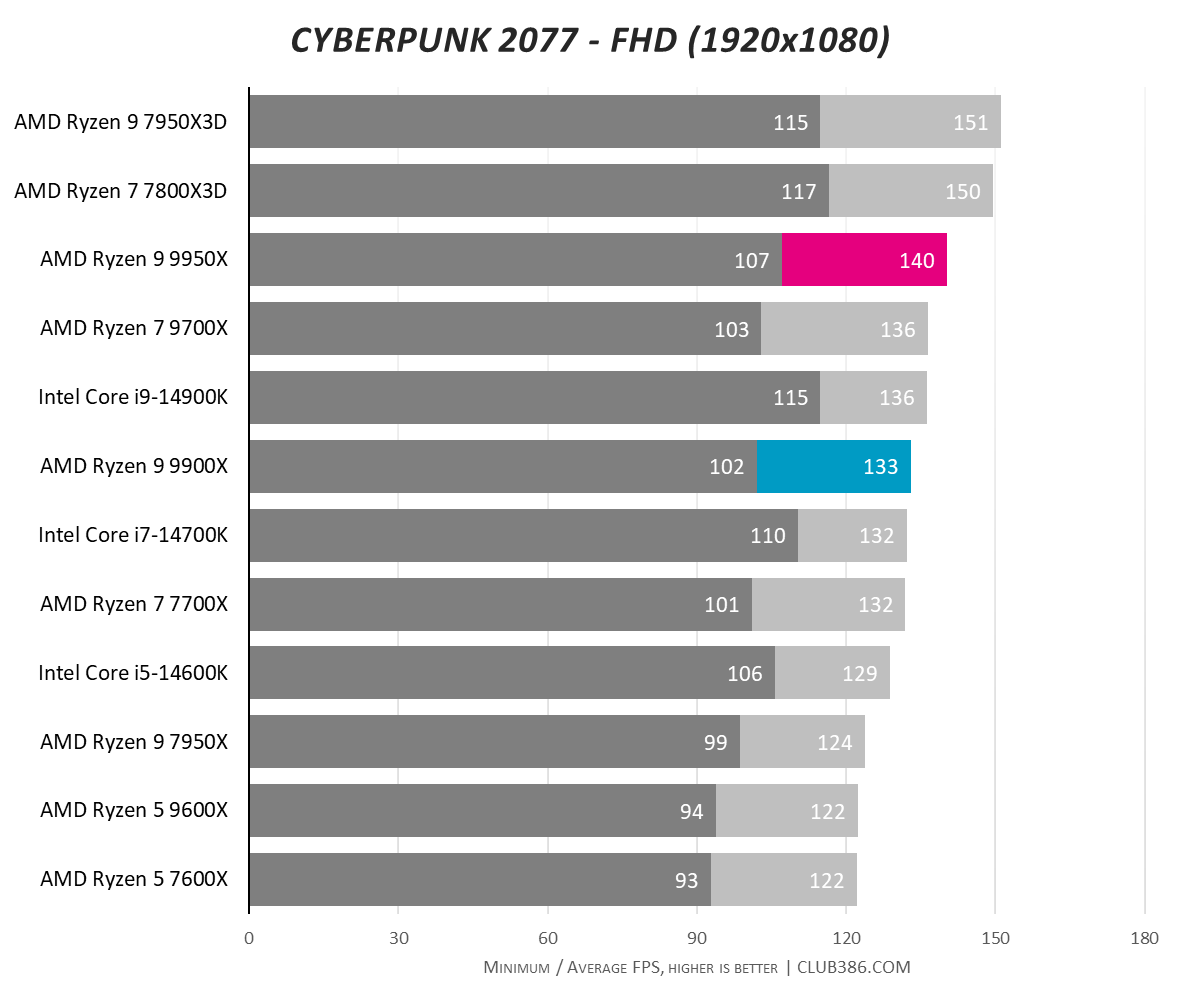
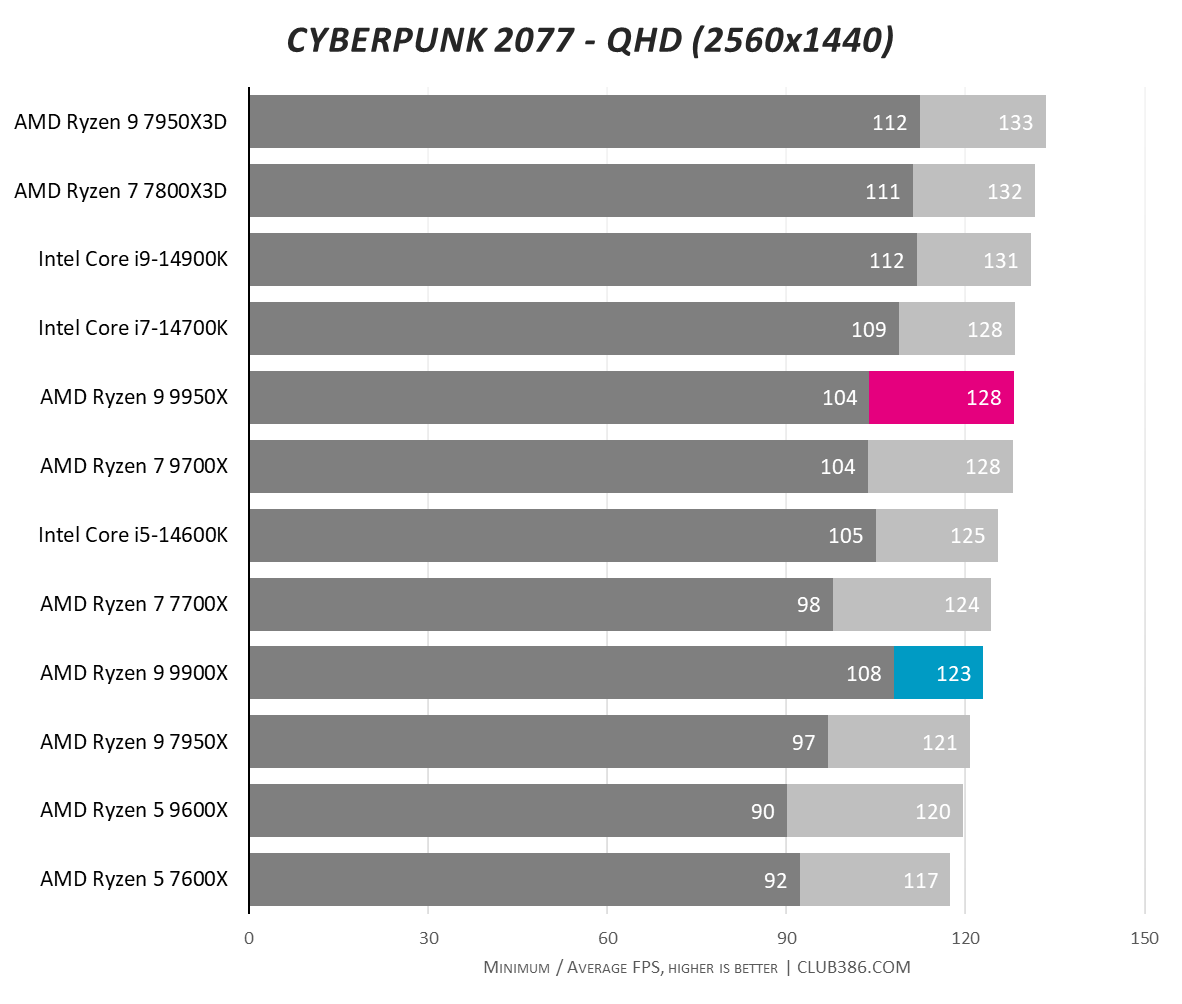
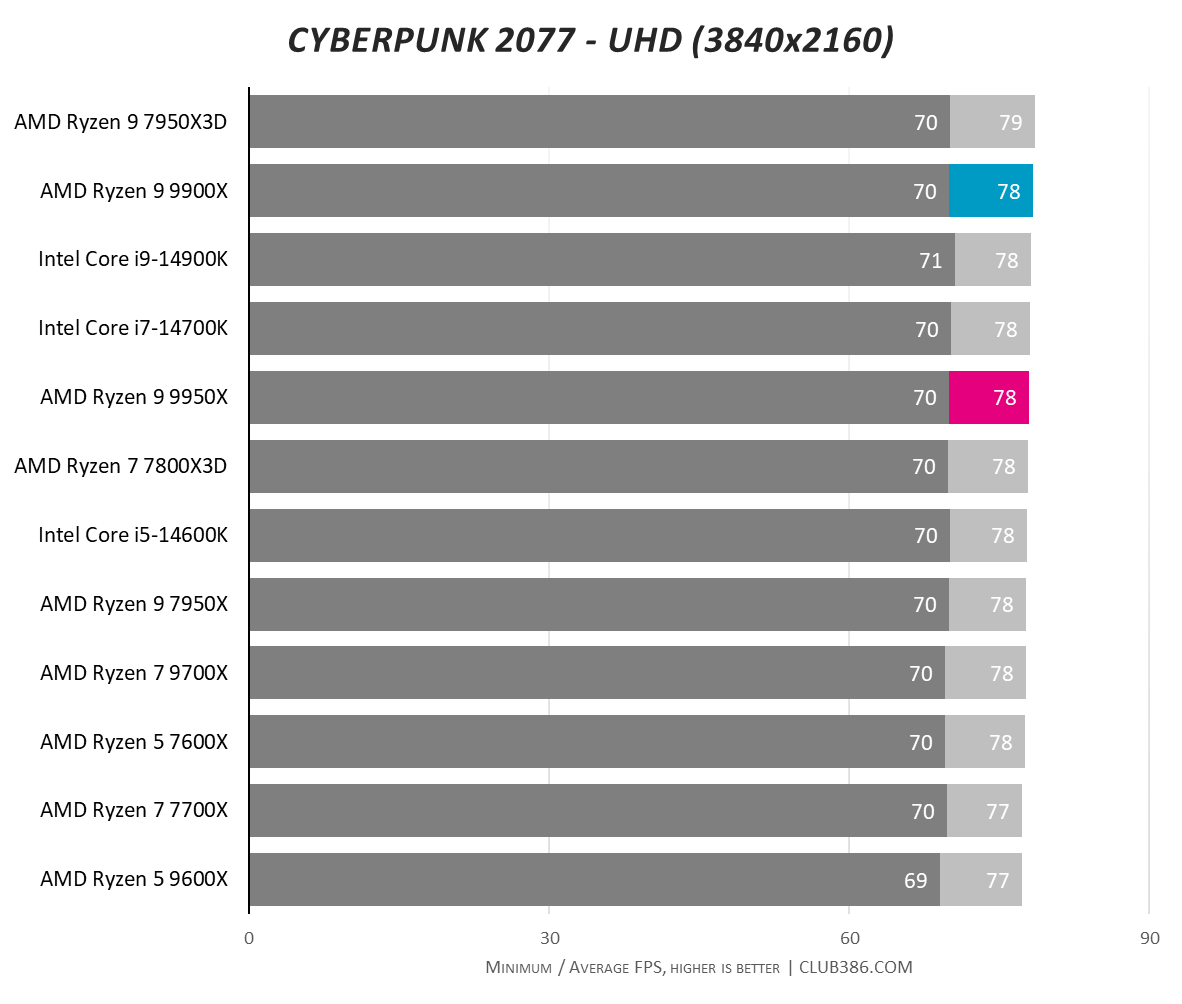
Cyberpunk loves a bit of Ryzen X3D love. Here’s why many enthusiasts will hold out for them, putting the non-X3D chips in a tough spot.
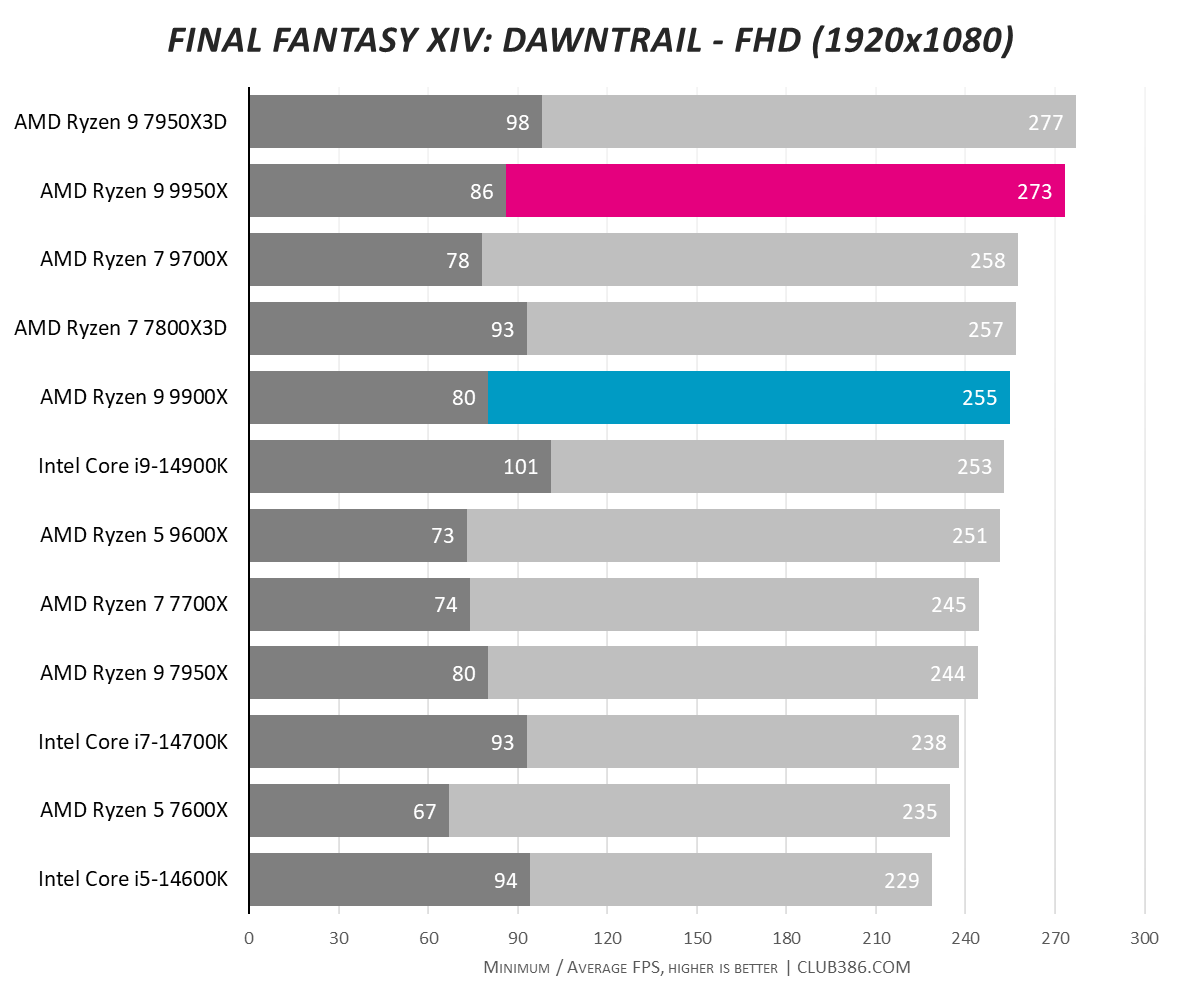
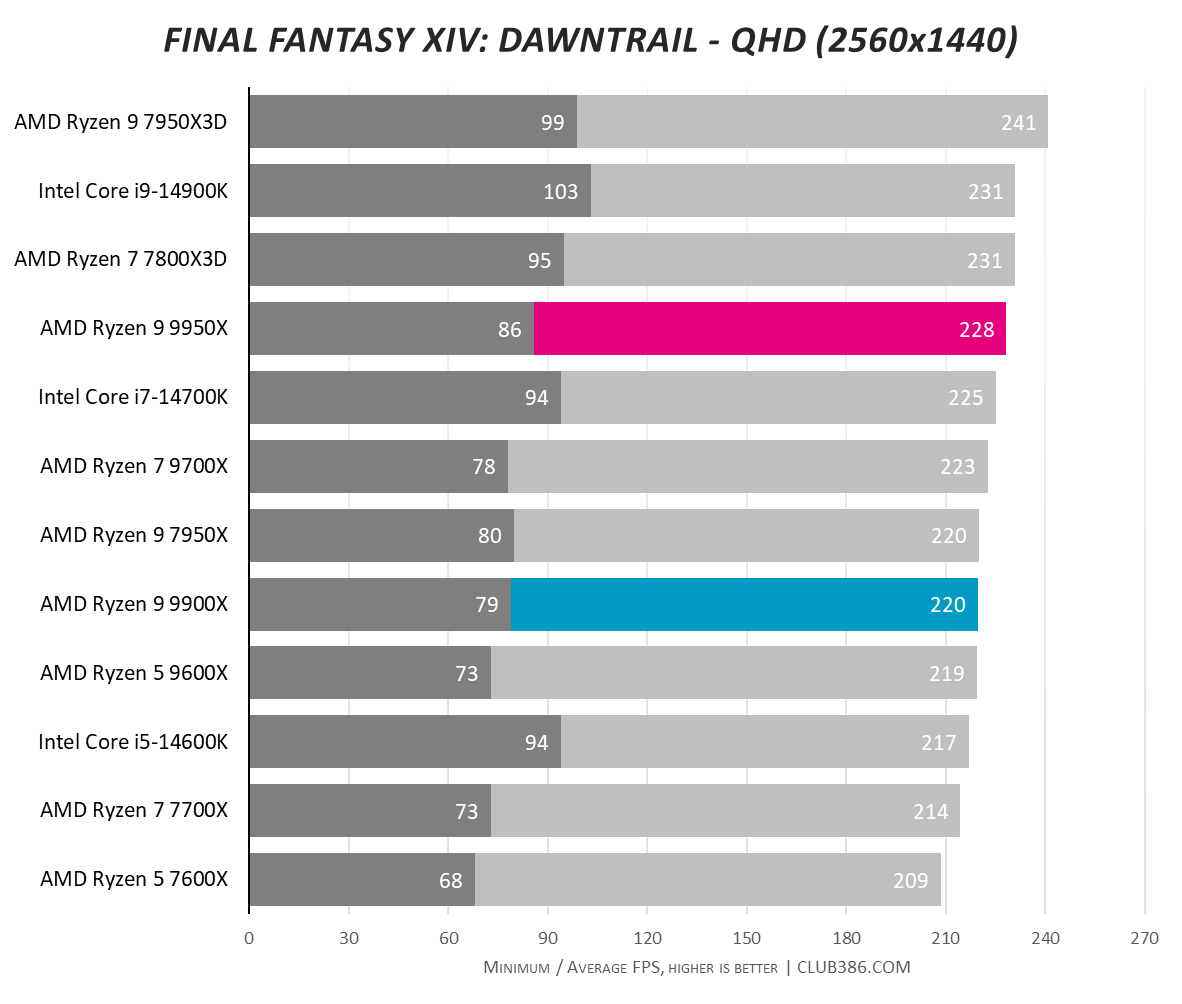
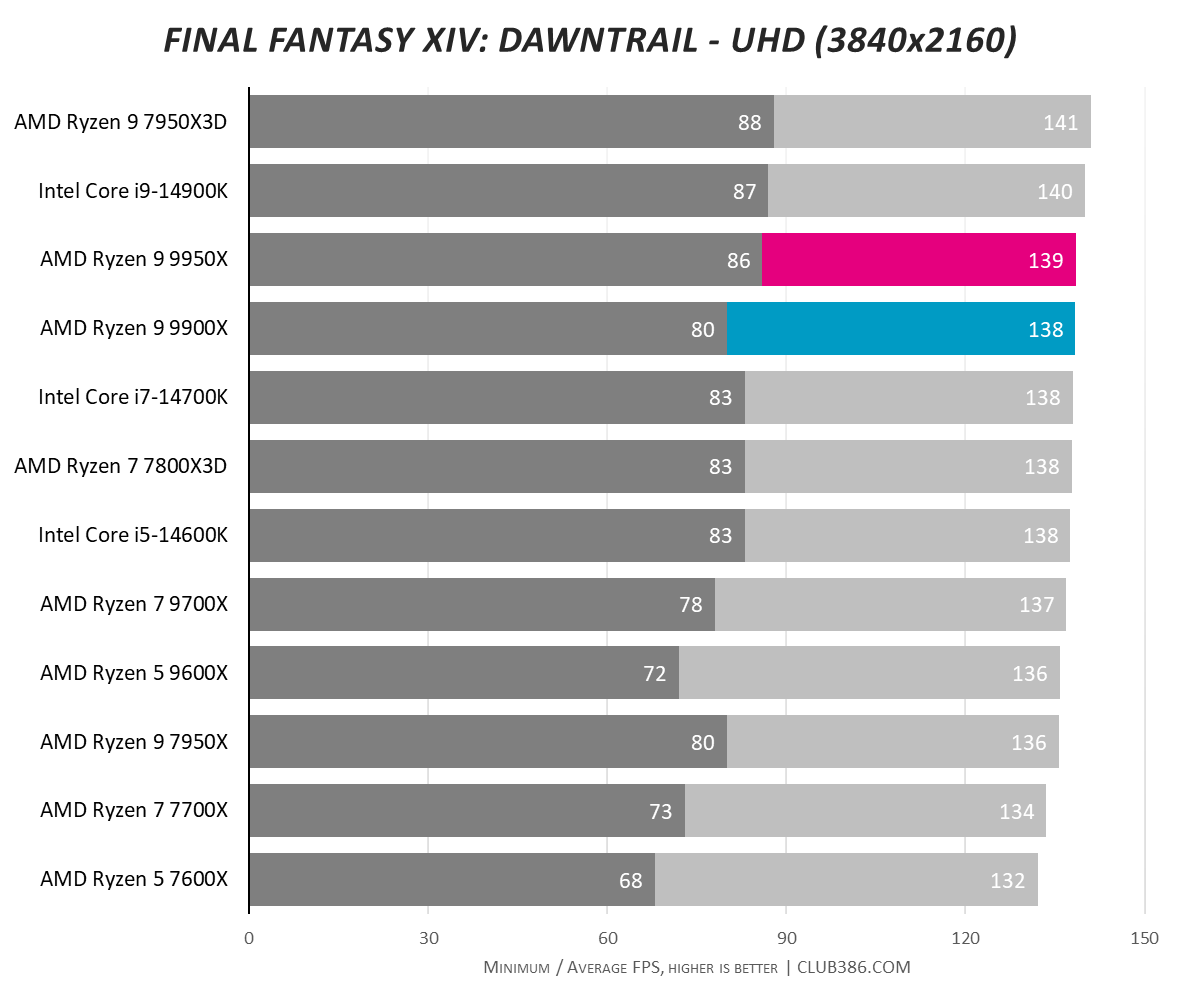
I’m not seeing generational improvements in Final Fantasy, either.
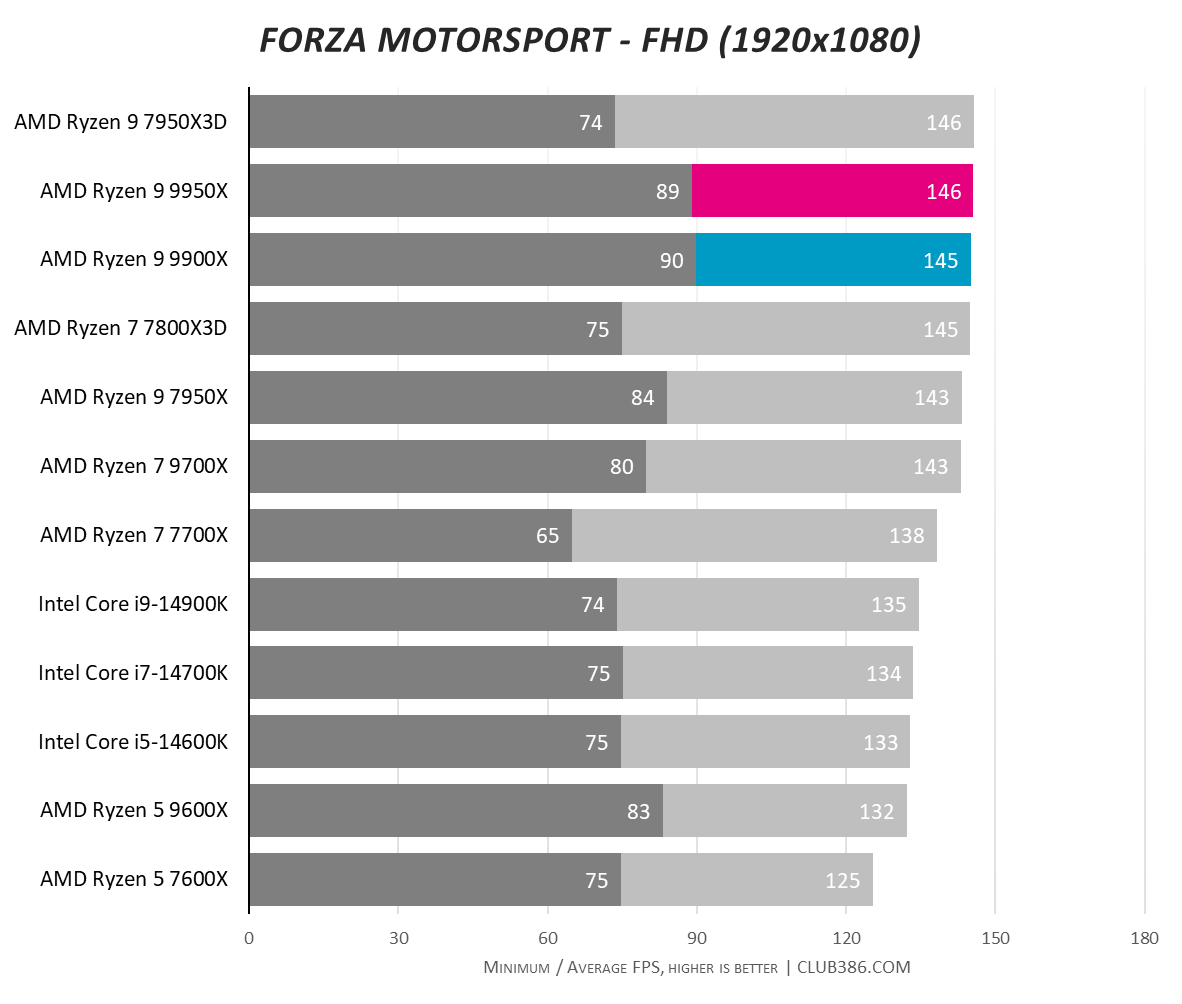
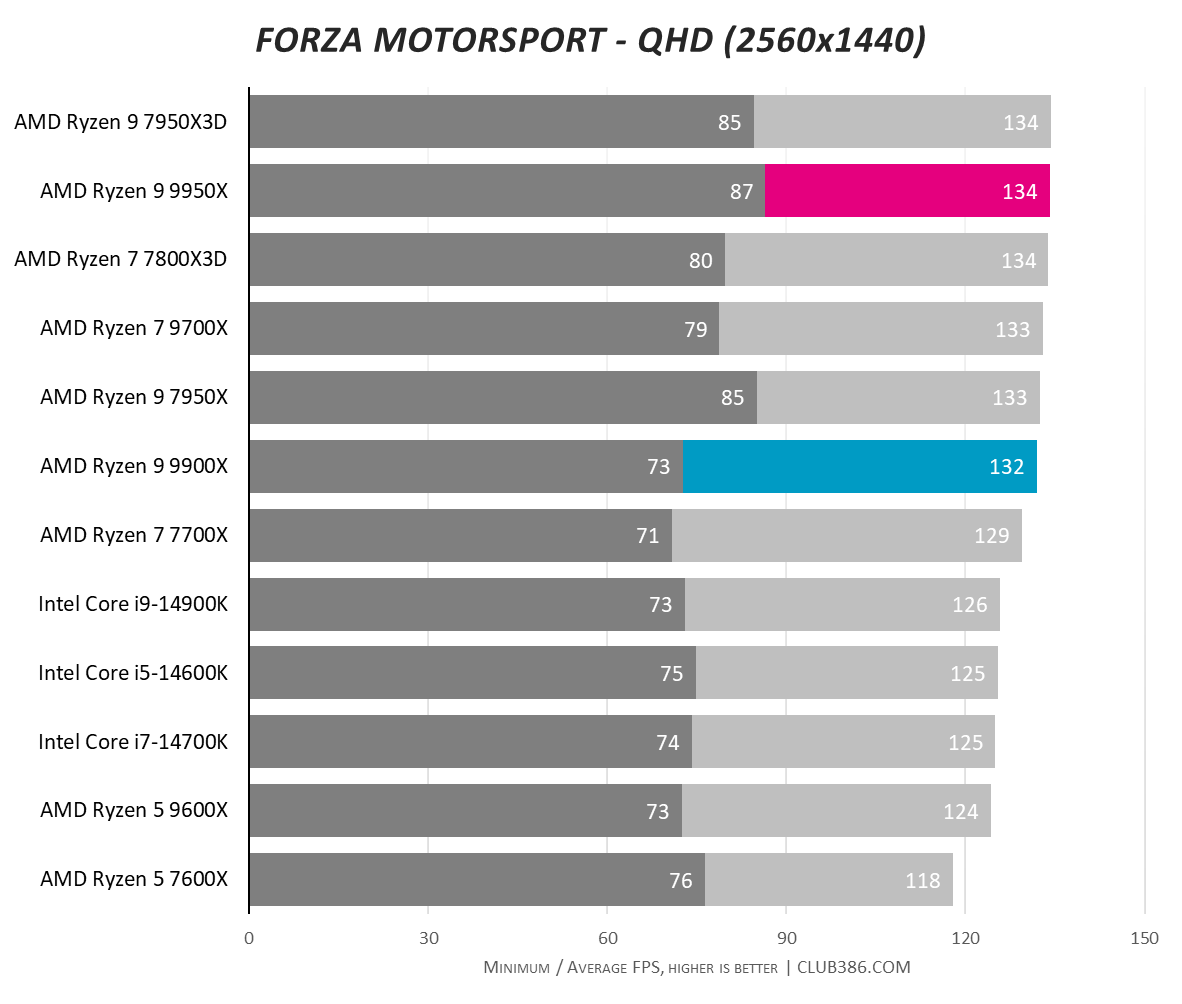
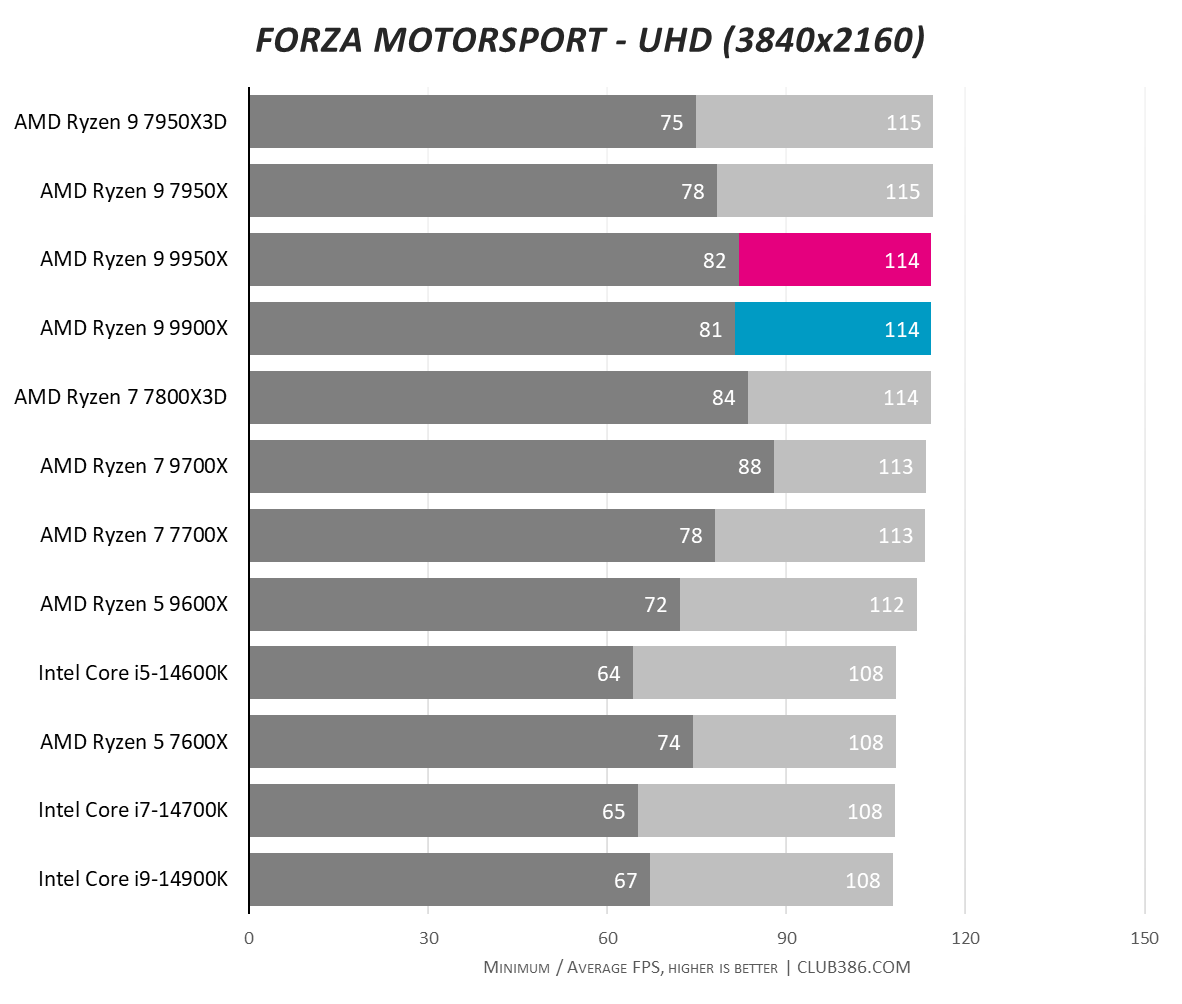
Forza Motorsport runs well on most modern CPUs. Using an RTX 4090 and gaming at 4K, I challenge anyone to visually define a difference between Ryzens.
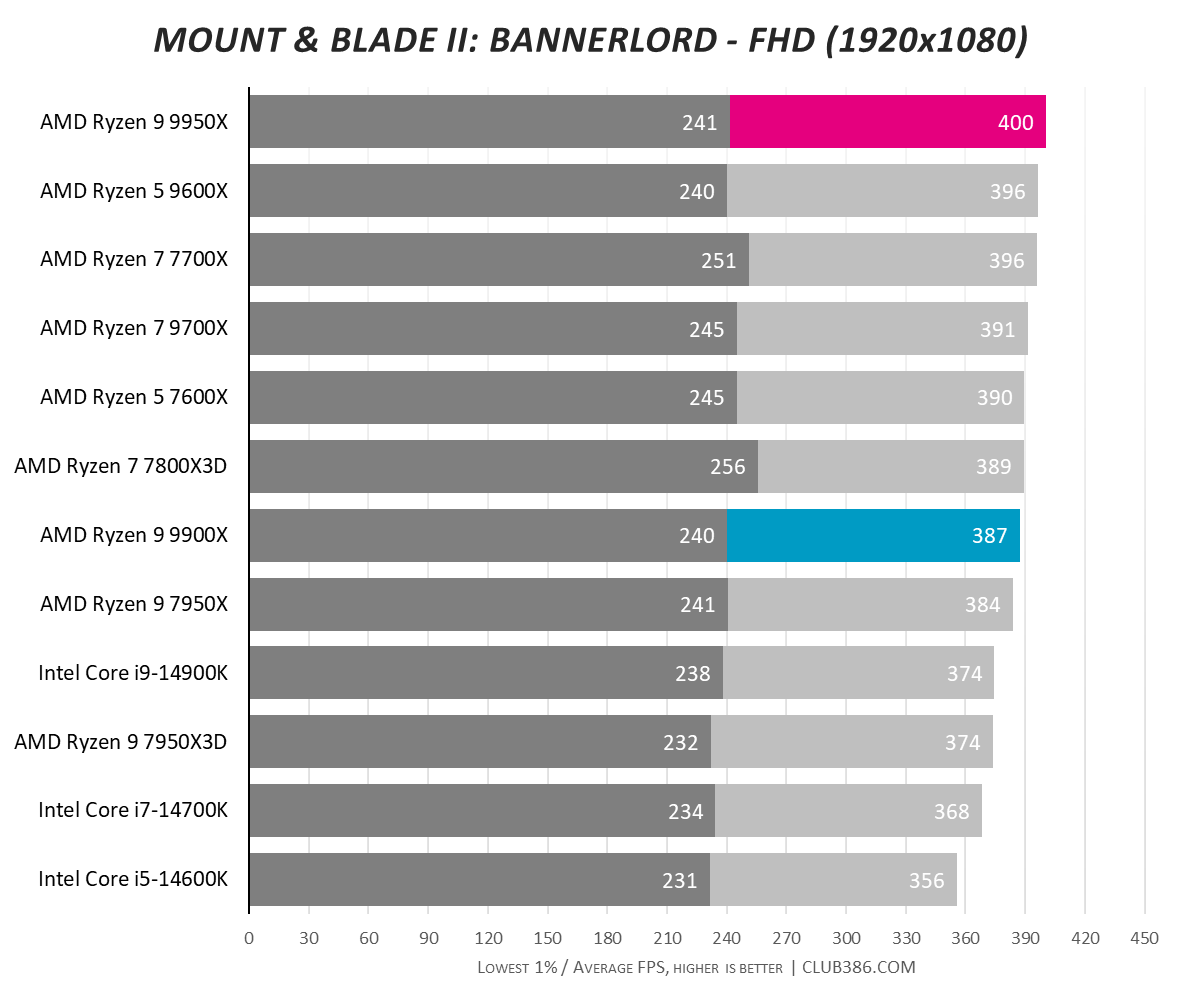
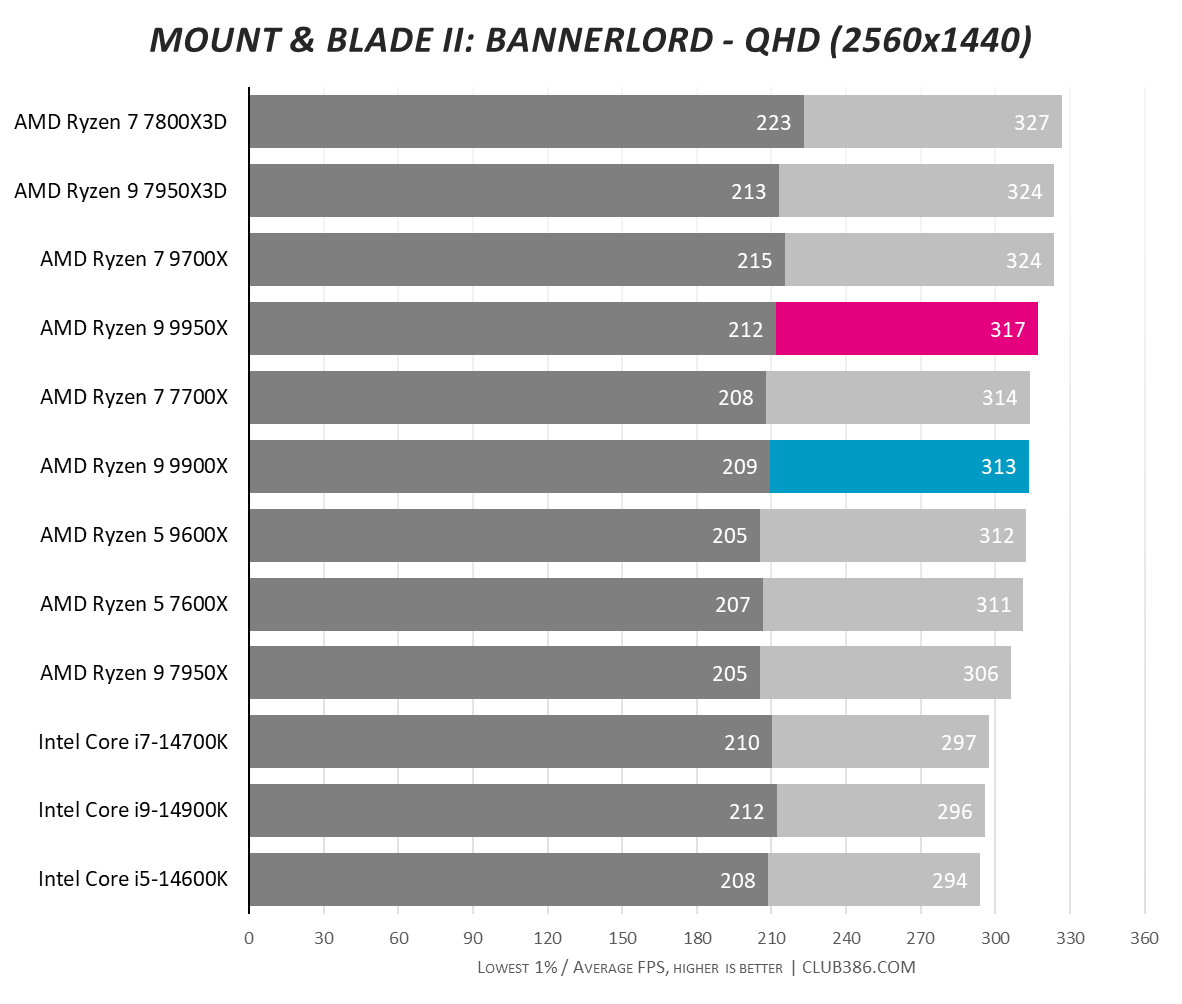
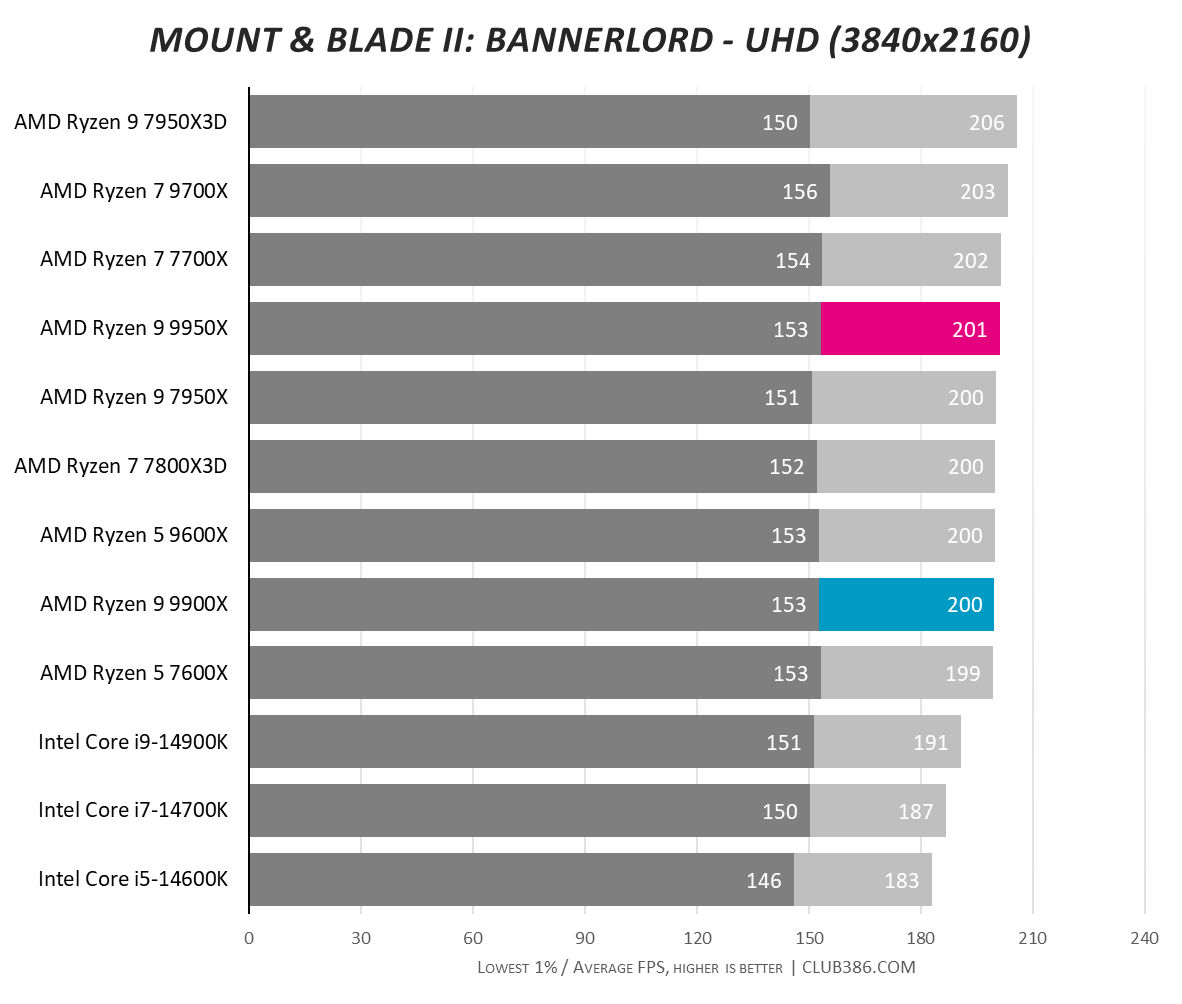
This CPU-intensive title also favours AMD chops. As a gamer, reiterating what I’ve said before, holding out for the X3D versions is a sage move.
Efficiency and Value
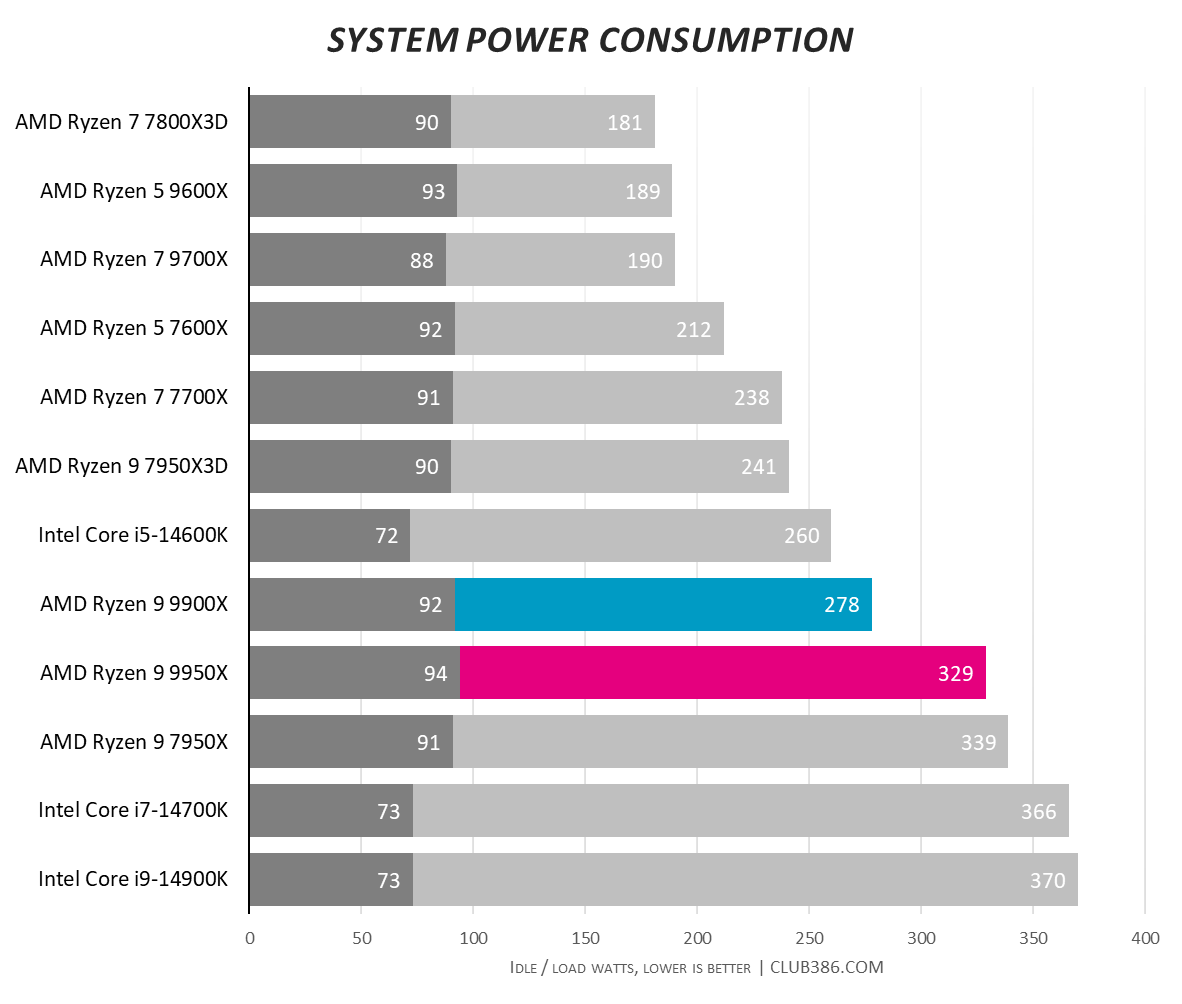
With more cores comes greater power. Are AMD’s power-saving gains over Intel actually meaningful? Ryzen 9 9900X, for example, pulls around 90 fewer watts than Core i7-14700K when running full-on productivity. The gap is around 65W when gaming on an RTX 4090.
Taking an average of 80W differential and assuming electricity costs 20p for a kilowatt hour, running the two selected systems for five hours a day (400W benefit in favour of AMD), every day for a year, leads to a 146-kilowatt saving, or around £29. You’d have to run the 9900X for two years to make up the cost difference between it and a £370 14700K. Food for thought.
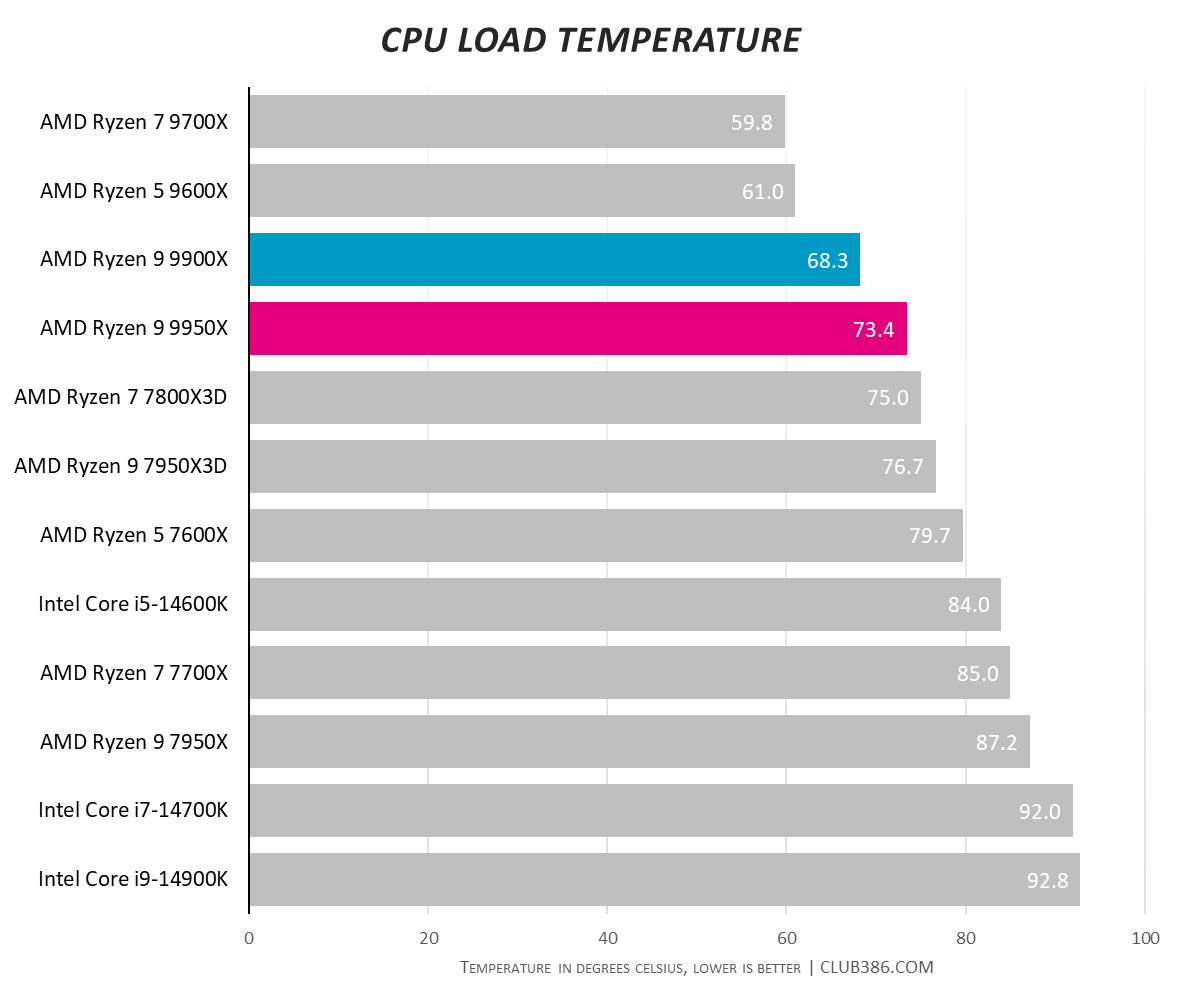
Here’s something interesting. Ryzen 9 9950X and 7950X pull approximately the same amount of power when rendering. That being the case, the former is way cooler, and this may have to do with the AMD’s sensor placement and enhanced floor planning between generations.
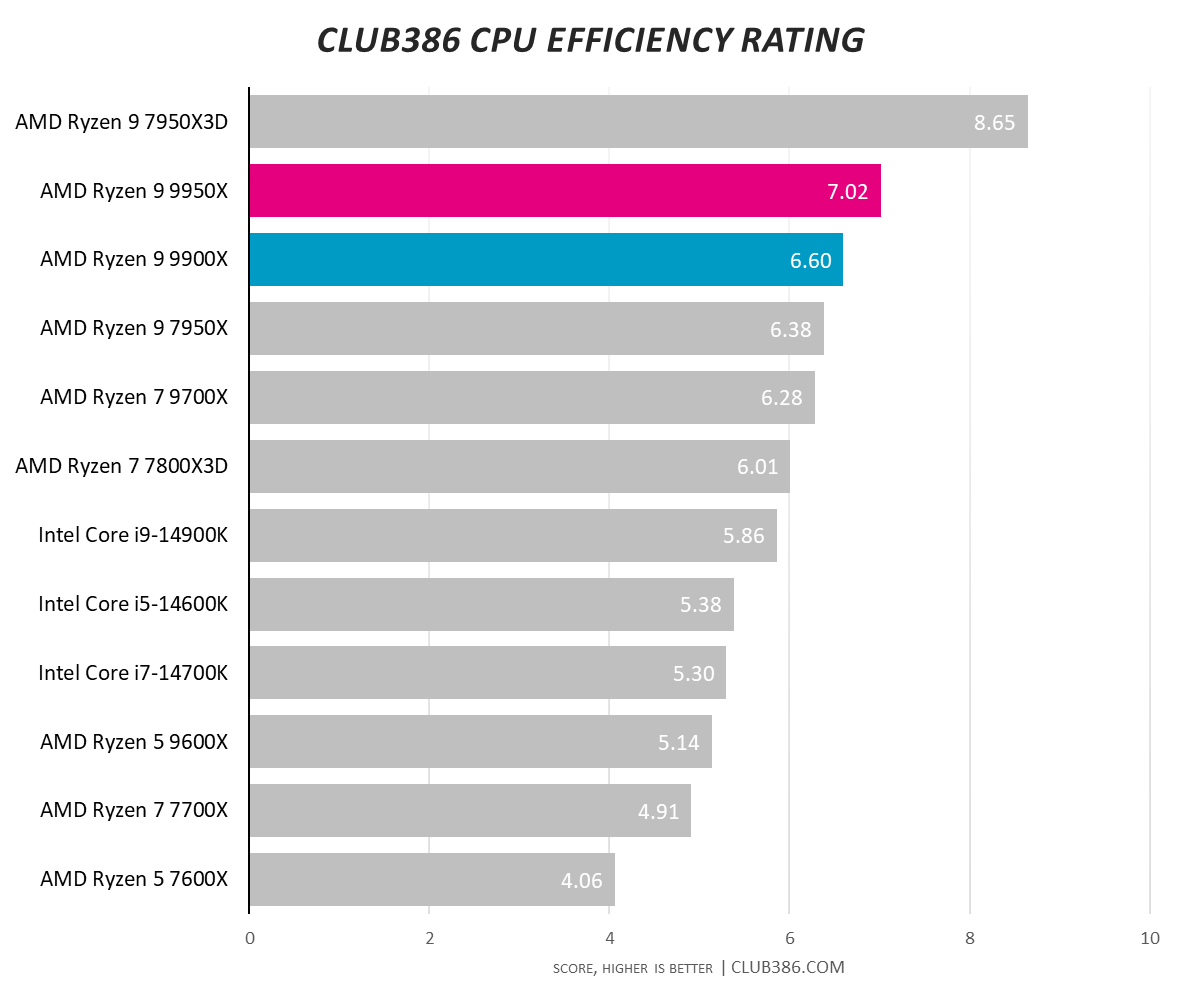
Here I divide the Cinebench 2024 nT score by observed system-wide wattage, arriving at an efficiency score. Can’t argue with AMD on this front.
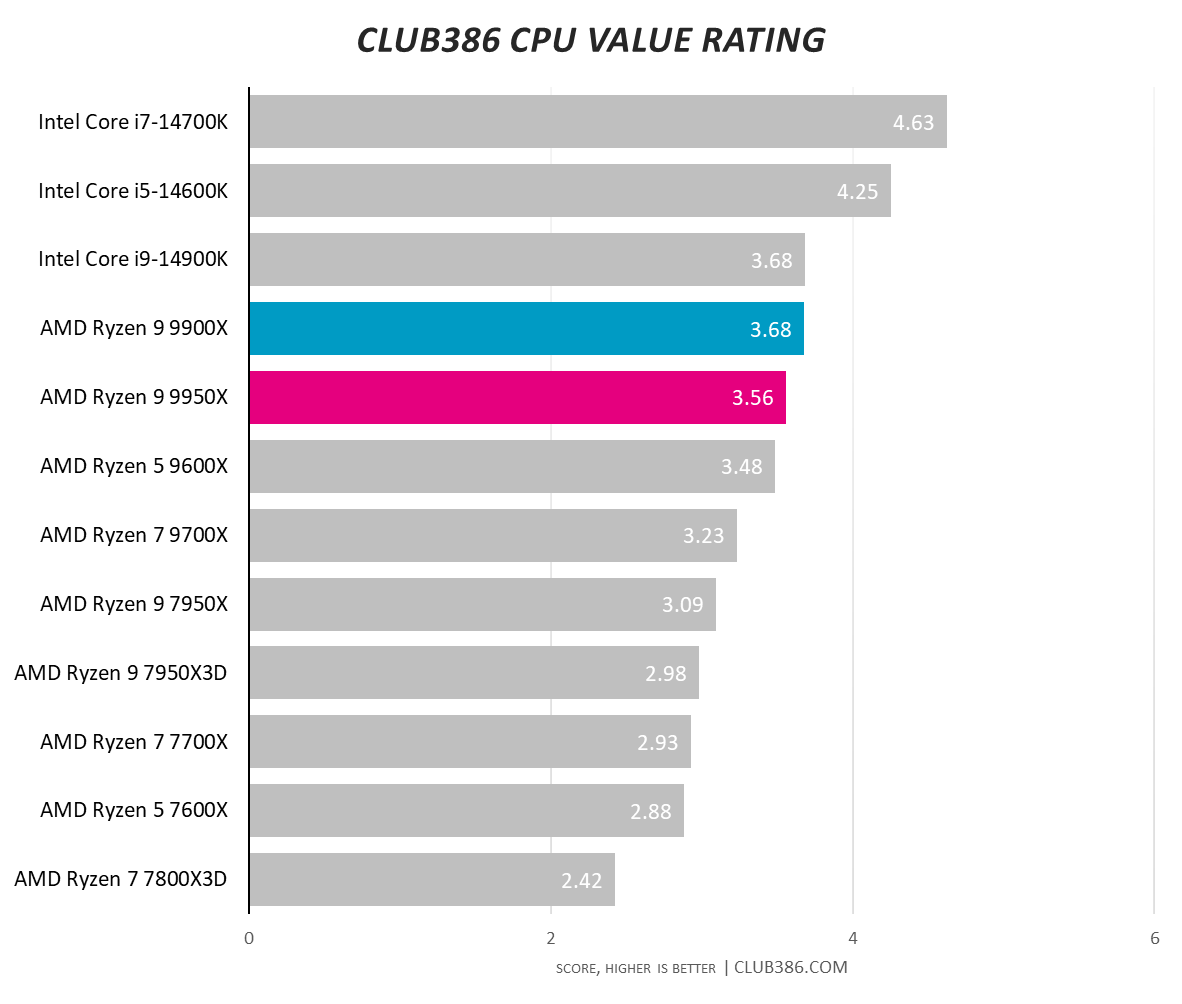
Meanwhile, here is the same Cinebench score divided by the launch USD MSRP. I’d expect mid-pack performance from 12- and 16-core chips. Be aware that plugging in today’s discounted pricing for older CPUs improves their metric significantly. A good example is the Ryzen 9 7950X, whose $519 / £445 current price elevates its score from 3.09 to 4.17.
Conclusion
AMD’s company-wide CPU ambition is plain to see with Zen 5. An architecture primed for shifting performance gears in the datacentre space, building performant enthusiast chips is a challenge.
The £610 Ryzen 9 9950X and £460 Ryzen 9 9900X embody Zen 5 in its finest desktop form. Keeping to the same core-and-thread count as previous generations bearing the same name, advancements derive from enhanced fundamentals alone.
That being the case, AMD limits opportunity of meaningful uplifts that’ll set hearts racing. Nevertheless, Ryzen 9 9950X does well on all fronts, becoming, on balance, the fastest desktop processor for productivity. The premier Zen 5 desktop chip is also adept at doling out frames for games, but I’d caution readers to wait for upcoming X3D parts if fragging is your main hobby.
Comparing the best of rival camps, AMD’s Ryzen 9 9950X is a better all-round CPU than Intel’s champion Core i9-14900K. It’s faster in rendering applications, at least as good in gaming, runs cooler, and pulls a little less wattage. Utilising a socket with long-term longevity, it’s a more futureproof proposition, too.
I look more favourably on Ryzen 9 9950X than I do on Ryzen 9 9900X. It trades blows with the Intel Core i7-14700K – which, remember, remains meaningfully cheaper – so the second-rung processor finds itself in an odd place against Intel and AMD’s own Ryzen 7950X that actually costs less right now. Dropping the price to $439 / £399 is an immediate remedy that’ll boost attractiveness.
The watchword with AMD Ryzen 9000 Series CPUs is conservatism. If it was my money on the line, I’d adopt a wait-and-see approach and evaluate what upcoming X3D parts bring to the table.
Verdict: AMD’s reluctance to add more cores inhibits Ryzen 9000 Series’ potential.

